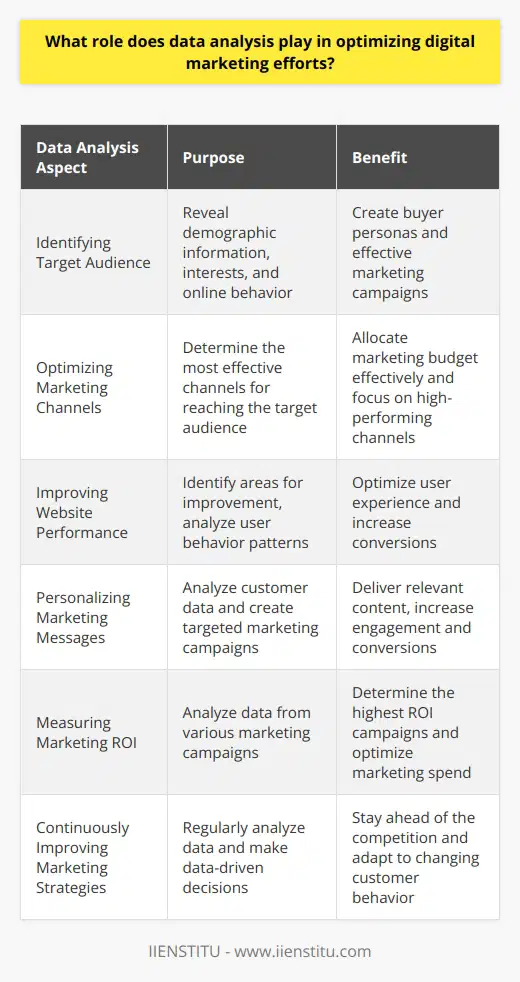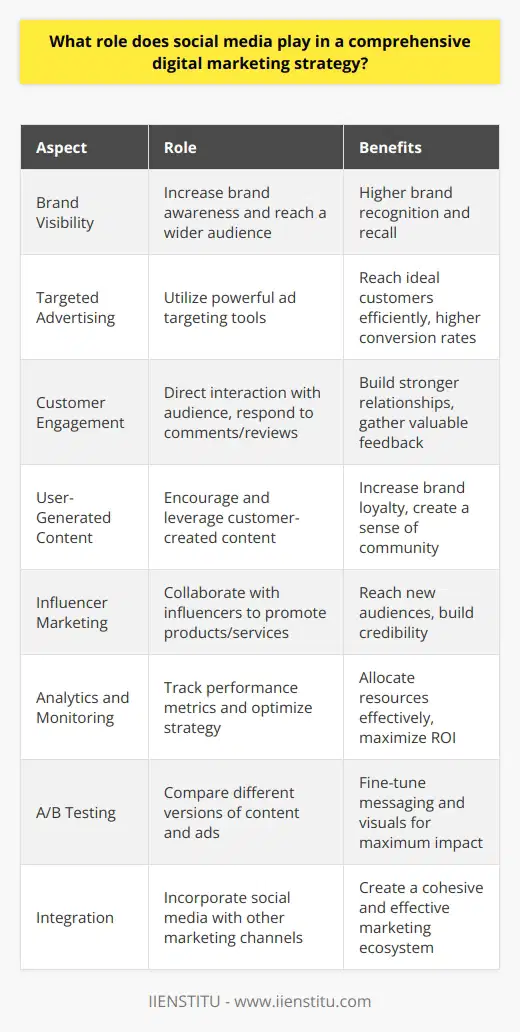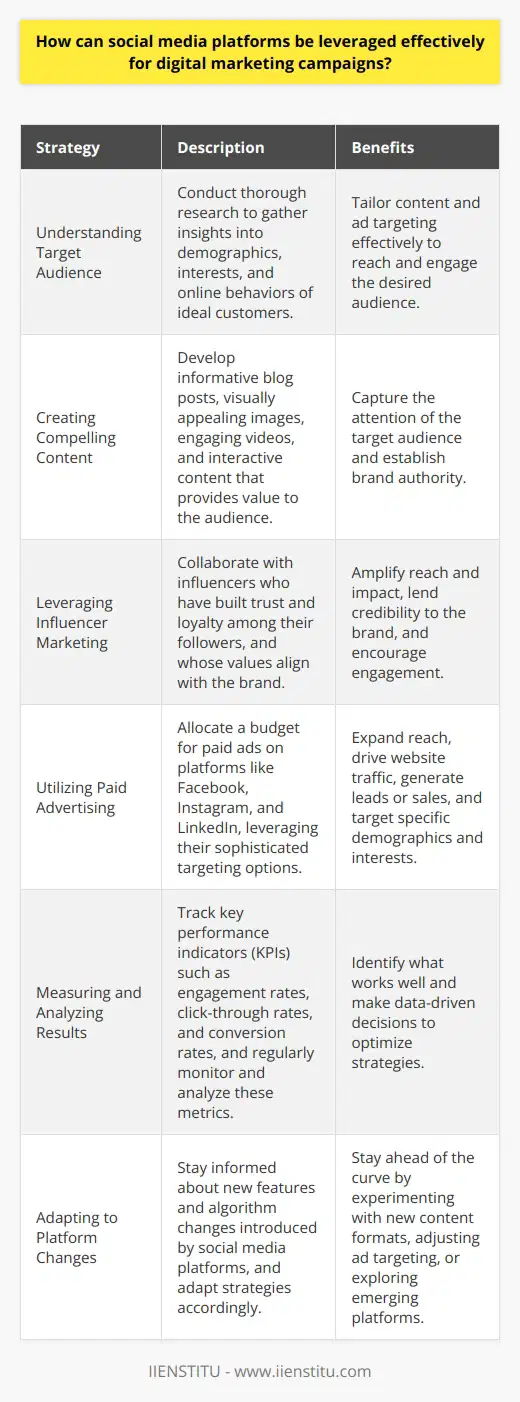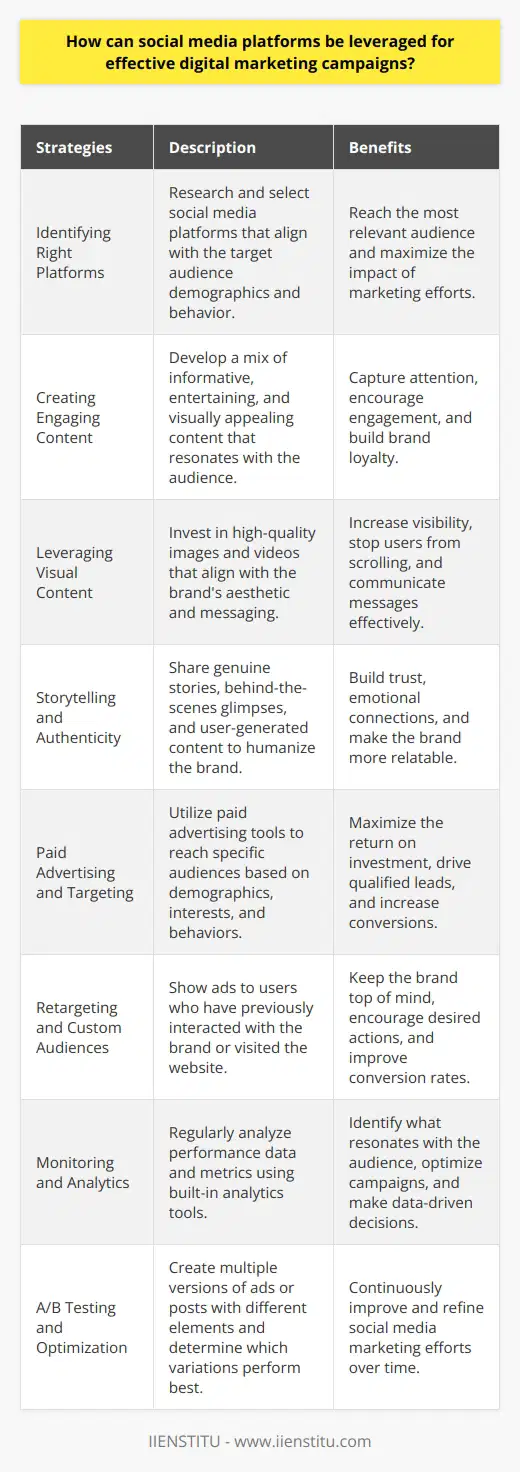
In today's interconnected world, digital marketing has become an essential tool for businesses to reach a global audience. With millions of people logging into the internet every day, companies have realized the potential that lies in expanding their marketing efforts beyond their local markets.
Related Course: Digital Marketing Course Online
As a result, the demand for professionals with experience in global digital marketing has skyrocketed. In this article, we will explore the reasons why this interview question is asked, the purpose it serves, at what interview level it is commonly asked, the kind of answer that is expected from candidates, and possible answers to consider.
Why is this interview question asked: Any Experience With Global Digital Marketing?
The question "Any experience with global digital marketing?" is commonly asked to assess a candidate's level of expertise and familiarity with marketing strategies that target an international audience.
It gives the interviewer insight into whether the candidate has worked on campaigns that expand beyond their immediate region, and whether they possess the knowledge and skills required to navigate the complexities of global marketing.
The Purpose of the Question
The purpose of this question is to determine whether the candidate has the necessary experience and understanding of global digital marketing practices. It helps employers gauge their ability to strategize, execute, and optimize marketing campaigns that can effectively reach and engage an international audience.
By assessing a candidate's experience with global digital marketing, companies can identify individuals who can contribute to their growth and success in the global marketplace.
At What Interview Level is it Asked?
This question is typically asked at intermediate to advanced interview levels, such as mid-level or senior-level positions. Companies seeking candidates for these roles often have a global presence or aspirations to expand internationally.
They are looking for individuals who can bring a wealth of experience and knowledge to their organization, enabling them to achieve their global marketing objectives.
What Kind of Answer is Expected from the Candidate?
When answering the question, candidates are expected to demonstrate their experience and expertise in global digital marketing. They should highlight specific campaigns or projects they have worked on that targeted international markets.
Candidates should discuss their knowledge of different digital platforms, their understanding of cultural nuances in various regions, and their ability to adapt marketing strategies to suit the needs and preferences of diverse audiences.
Possible Answers to Consider
Discussing Relevant Campaigns or Projects: Candidates can provide examples of campaigns or projects they have worked on that specifically targeted global audiences. They can highlight the objectives of these campaigns, the strategies employed, and the results achieved. By showcasing successful experiences, candidates demonstrate their ability to effectively navigate the complexities of global digital marketing.
Highlighting Cross-Cultural Competence: Candidates can emphasize their understanding of different cultures and their ability to tailor marketing messages to resonate with diverse audiences. They can discuss how they have adapted their strategies to meet cultural preferences, language barriers, and regional trends, thereby showcasing their versatility and adaptability in a global context.
Showcasing Digital Platform Expertise: Candidates can demonstrate their knowledge of various digital platforms commonly used in global marketing, such as social media platforms, search engines, and online advertising networks. They can discuss their experience with leveraging these platforms to reach and engage international audiences, highlighting any innovative strategies or techniques they have employed.
What to Consider When Answering
When answering this question, it is essential to be specific, provide concrete examples and metrics whenever possible, and highlight the results achieved.
Candidates should also showcase their ability to analyze data and make data-driven decisions to optimize global marketing campaigns.
Additionally, it is important to highlight any experiences working with multicultural teams or managing international partnerships, as this demonstrates a broader understanding of global business dynamics.
In conclusion, the question "Any experience with global digital marketing?" is a common interview question aimed at assessing a candidate's familiarity with marketing strategies targeted at international audiences.
Candidates should provide specific examples of campaigns or projects they have worked on, highlight cross-cultural competence, and showcase their expertise in leveraging digital platforms.
By demonstrating their experience and knowledge in global digital marketing, candidates can position themselves as valuable assets to companies with a global presence.
Global Digital Marketing Strategies and Tactics
Key Digital Marketing Channels and Platforms for Global Reach
Challenges and Best Practices in Global Digital Marketing
Similar interview questions:
How familiar are you with the field of global digital marketing?
Can you share any examples of projects you have worked on in the realm of global digital marketing?
Have you ever managed international digital marketing campaigns before? If so, could you describe the nature of your experience?
Are you knowledgeable about implementing global digital marketing strategies across diverse cultural contexts?
Could you discuss any challenges you have encountered while executing global digital marketing campaigns?
Have you ever collaborated with international teams or stakeholders in the context of digital marketing initiatives?
Can you provide details about your expertise in targeting and engaging global audiences through various digital marketing platforms?
In what ways do you stay updated with best practices and emerging trends in global digital marketing?
How do you ensure consistent branding and messaging across different countries and cultures in your digital marketing efforts?
What strategies do you employ to measure the effectiveness and ROI of your global digital marketing campaigns?
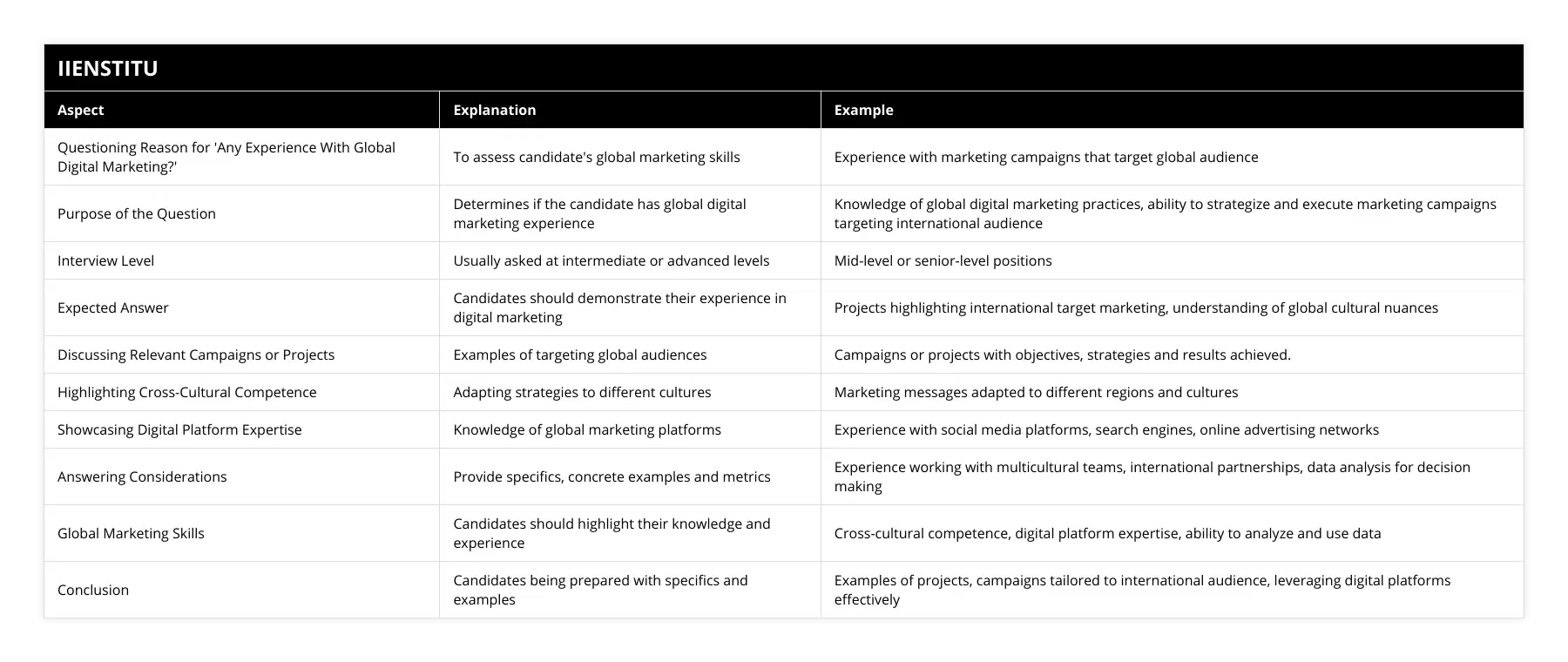
Frequently Asked Questions
What experience do you have with global digital marketing campaigns?
I have extensive experience in developing and executing global digital marketing campaigns across various industries. My expertise lies in creating comprehensive strategies that encompass search engine optimization (SEO), pay-per-click (PPC) advertising, social media marketing, and content marketing.
Developing Comprehensive Digital Marketing Strategies
I start by conducting thorough market research to identify target audiences, competitors, and industry trends. This information helps me develop a tailored digital marketing strategy that aligns with the client's goals and objectives. I create detailed plans that outline tactics, timelines, and key performance indicators (KPIs) to measure success.
Implementing SEO Best Practices
To improve organic search rankings, I implement SEO best practices throughout the campaign. This includes conducting keyword research, optimizing website content and meta tags, and building high-quality backlinks. I stay up-to-date with the latest algorithmic changes to ensure the campaign remains effective.
Managing PPC Campaigns
I have managed numerous PPC campaigns on platforms like Google Ads, Bing Ads, and social media networks. I create compelling ad copy, select relevant keywords, and optimize landing pages to improve click-through rates (CTR) and conversions. I continuously monitor and adjust campaigns to maximize return on investment (ROI).
Leveraging Social Media Marketing
I leverage social media platforms to increase brand awareness, engage with target audiences, and drive website traffic. I develop content calendars, create engaging posts, and monitor social media metrics to optimize performance. I also collaborate with influencers and run social media advertising campaigns to expand reach.
Creating Engaging Content
Content marketing is a crucial component of my digital marketing campaigns. I develop informative and engaging content, such as blog posts, infographics, videos, and eBooks, to attract and retain target audiences. I ensure that all content is search engine optimized and aligns with the overall marketing strategy.
Measuring and Analyzing Campaign Performance
Throughout the campaign, I use various tools and analytics platforms to measure performance and identify areas for improvement. I create detailed reports that highlight key metrics, such as website traffic, conversion rates, and engagement levels. I use this data to make data-driven decisions and optimize the campaign for better results.
My experience in global digital marketing campaigns has allowed me to develop a diverse skill set and deliver successful results for clients across various industries.
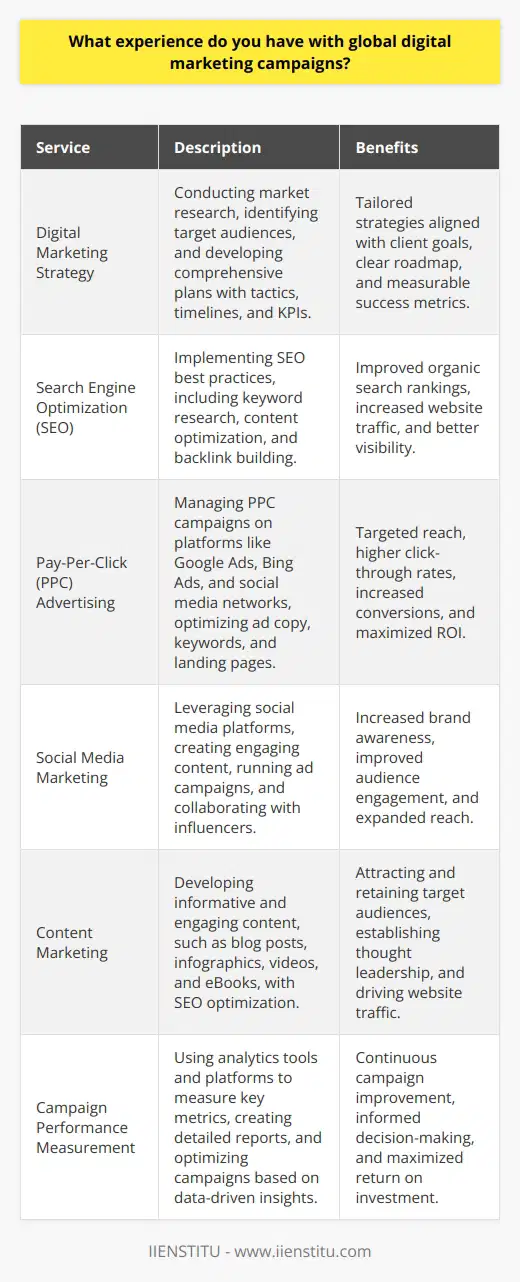
How do you stay up-to-date with the latest trends and best practices in digital marketing?
Staying up-to-date with the latest trends and best practices in digital marketing is crucial for success. One effective method is to regularly read industry blogs and publications. These resources provide valuable insights into emerging technologies, strategies, and case studies. Attending conferences and webinars is another excellent way to learn from experts and network with peers.
Engage with Industry Leaders on Social Media
Following and engaging with industry leaders on social media platforms like Twitter and LinkedIn is beneficial. These influencers often share their knowledge, experiences, and opinions on current digital marketing trends. Participating in online discussions and forums can also help you gain exposure to new ideas and perspectives.
Experiment with New Tools and Techniques
Hands-on experience is essential for staying current in digital marketing. Experiment with new tools and techniques to gain practical knowledge. This approach allows you to understand the capabilities and limitations of various strategies firsthand. Continuously testing and refining your skills will help you stay ahead of the curve.
Analyze Competitor Strategies
Analyzing your competitors' digital marketing strategies can provide valuable insights into industry trends. Observe their content, social media presence, and advertising campaigns. Identify what works well for them and consider adapting those techniques to your own strategy. Competitor analysis helps you stay competitive and identifies areas for improvement.
Invest in Continuous Learning
Investing in continuous learning is vital for staying up-to-date in digital marketing. Enroll in online courses, workshops, and certification programs. These educational opportunities help you acquire new skills and deepen your understanding of various aspects of digital marketing. Dedicating time and resources to professional development ensures you remain knowledgeable and competent in this ever-evolving field.
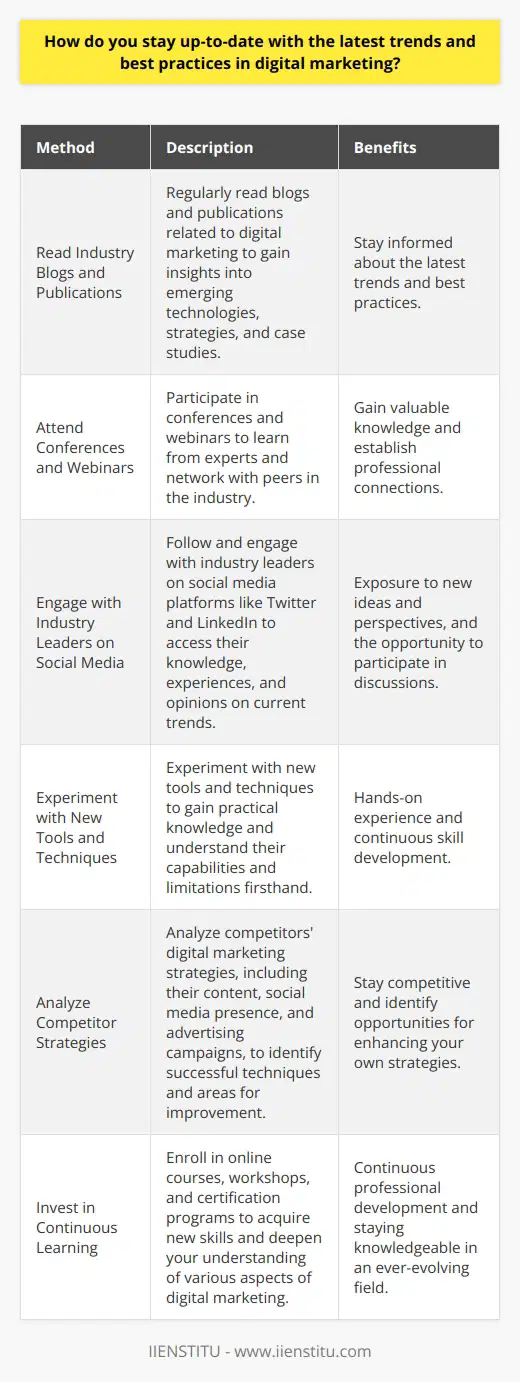
Can you provide an example of a successful global digital marketing initiative you have worked on?
One successful global digital marketing initiative I worked on involved a multinational e-commerce company expanding into emerging markets. The objective was to increase brand awareness and drive sales in these new territories. We developed a comprehensive strategy that encompassed various digital channels and tactics.
Market Research and Localization
We began by conducting thorough market research to understand the cultural nuances, consumer preferences, and digital landscapes of each target country. This insight informed our decision to localize our marketing content, website, and product offerings. We collaborated with local teams to ensure that our messaging resonated with the target audience and complied with regional regulations.
Social Media Marketing
We launched targeted social media campaigns on platforms popular in each country, such as Facebook, Instagram, and local networks. Our content featured a mix of translated and original posts, including engaging visuals, videos, and influencer collaborations. We also ran social media ads to reach a wider audience and drive traffic to our localized websites.
Influencer Partnerships
Partnering with local influencers was a key component of our social media strategy. We identified influencers who aligned with our brand values and had a strong following in our target markets. These influencers created authentic content showcasing our products and helped us build trust with their followers.
Search Engine Optimization (SEO)
To improve our visibility in local search results, we implemented a robust SEO strategy. This included optimizing our website content for relevant keywords in each language, building local backlinks, and ensuring our site structure was search engine-friendly. We also set up Google My Business profiles for each country to enhance our local presence.
Email Marketing
We segmented our email marketing campaigns based on geographic location and customer preferences. Our emails featured personalized product recommendations, promotions, and content tailored to each market. We also incorporated local holidays and events into our email marketing calendar to create a stronger connection with our audience.
Mobile Optimization
Recognizing the growing importance of mobile commerce in emerging markets, we prioritized mobile optimization across all our digital touchpoints. We ensured our websites were responsive, fast-loading, and easy to navigate on mobile devices. We also developed mobile-specific ad campaigns and implemented mobile-friendly payment options.
Results and Key Learnings
The global digital marketing initiative yielded impressive results. We saw a significant increase in website traffic, user engagement, and sales in our target markets. Key learnings included the importance of localization, the power of influencer partnerships, and the need for a mobile-first approach in emerging markets.
By adapting our strategies to the unique characteristics of each market and leveraging a mix of digital channels, we successfully expanded our brand's reach and achieved our business objectives on a global scale.

What are the most effective digital marketing strategies for increasing website traffic?
To increase website traffic, digital marketers can employ various strategies that have proven effective in attracting visitors. Search engine optimization (SEO) is a crucial technique that involves optimizing website content and structure to rank higher in search results. By conducting keyword research and incorporating relevant keywords into website content, businesses can improve their visibility on search engines.
Additionally, creating high-quality, engaging content is essential for attracting and retaining website visitors. This content should be informative, relevant, and valuable to the target audience. Regularly updating the website with fresh content, such as blog posts, videos, and infographics, can keep visitors coming back for more.
Leverage Social Media
Social media platforms offer excellent opportunities for driving traffic to a website. By creating and sharing compelling content on social media, businesses can engage with their target audience and encourage them to visit their website. Paid social media advertising can also be an effective way to reach a larger audience and drive targeted traffic to the website.
Influencer Marketing
Collaborating with influencers in your industry can help expose your website to a wider audience. Influencers have built trust and credibility with their followers, and their endorsement can lead to increased website traffic.
Email Marketing
Email marketing is another powerful strategy for driving website traffic. By building an email list of subscribers interested in your content, you can regularly send them updates, promotions, and valuable information. Including links to your website in your emails can encourage subscribers to visit your site and engage with your content.
Guest Blogging
Writing guest posts for other reputable websites in your industry can help you reach a new audience and drive traffic back to your site. By providing valuable content and including a link to your website in your author bio, you can attract visitors who are interested in your expertise.
Optimize for Mobile
With the increasing use of mobile devices, it's crucial to ensure that your website is mobile-friendly. A responsive design that adapts to different screen sizes can provide a better user experience and encourage visitors to stay on your site longer.
Monitor and Analyze
To determine the effectiveness of your digital marketing strategies, it's essential to monitor and analyze your website traffic. Use tools like Google Analytics to track your website's performance, identify which strategies are driving the most traffic, and make data-driven decisions to optimize your efforts.
By implementing a combination of these digital marketing strategies and continuously refining your approach based on data and insights, you can effectively increase your website traffic and reach your target audience.
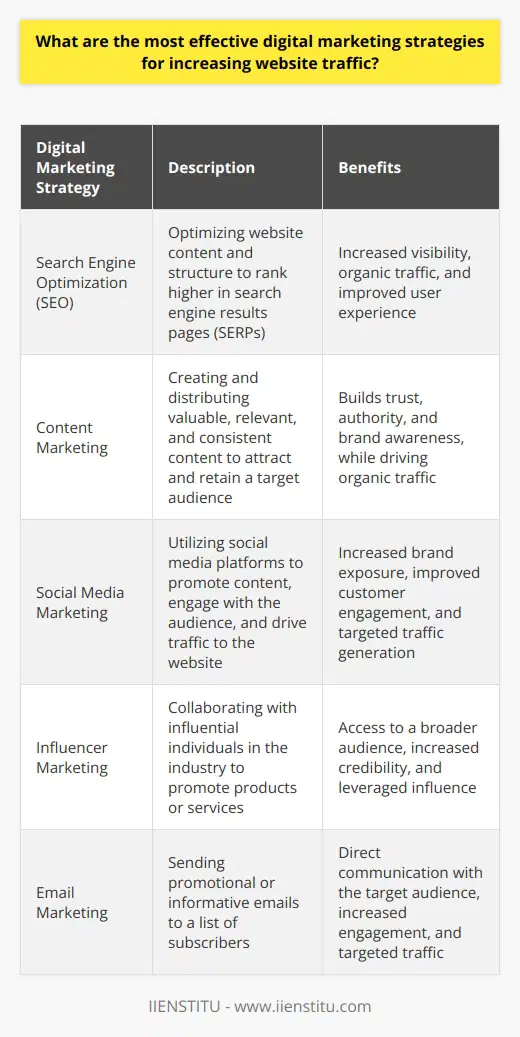
How do you measure the success of a digital marketing campaign?
Measuring the success of a digital marketing campaign involves analyzing various metrics and key performance indicators (KPIs). These metrics help marketers determine whether their efforts are yielding the desired results and identify areas for improvement. Some essential KPIs to consider when evaluating a digital marketing campaign include:
Website Traffic
Monitor the number of visitors to your website before, during, and after the campaign. Use tools like Google Analytics to track the sources of traffic, such as organic search, social media, or paid advertising. An increase in website traffic from your target audience is a positive indicator of campaign success.
Engagement Metrics
Measure how users interact with your content, such as likes, comments, shares, and click-through rates (CTR). High engagement levels suggest that your content resonates with your target audience and encourages them to take action. Monitor these metrics across various platforms, including social media, email campaigns, and blog posts.
Conversion Rates
Track the number of visitors who complete a desired action, such as making a purchase, filling out a form, or subscribing to a newsletter. Calculate the conversion rate by dividing the number of conversions by the total number of visitors. A higher conversion rate indicates that your campaign effectively guides users through the sales funnel.
Return on Investment (ROI)
Evaluate the financial impact of your campaign by calculating the ROI. Divide the net profit generated by the campaign by the total cost of the campaign. A positive ROI suggests that the campaign is profitable and justifies the investment in digital marketing efforts.
Brand Awareness and Reach
Assess the growth of your brand's online presence and reach. Monitor metrics such as brand mentions, follower growth, and impressions across various digital channels. Increased brand awareness and reach indicate that your campaign is effectively expanding your brand's visibility and attracting new potential customers.
Customer Feedback and Sentiment
Analyze customer feedback, reviews, and sentiment towards your brand and products. Positive feedback and sentiment suggest that your campaign is successfully building trust and loyalty among your target audience. Monitor social media conversations, online reviews, and customer surveys to gather valuable insights.
To accurately measure the success of a digital marketing campaign, establish clear goals and KPIs before launching the campaign. Regularly monitor and analyze the relevant metrics throughout the campaign duration. Use the insights gained from data analysis to optimize your strategies and make data-driven decisions for future campaigns. Remember that measuring success is an ongoing process that requires continuous monitoring, testing, and adaptation to ensure the effectiveness of your digital marketing efforts.
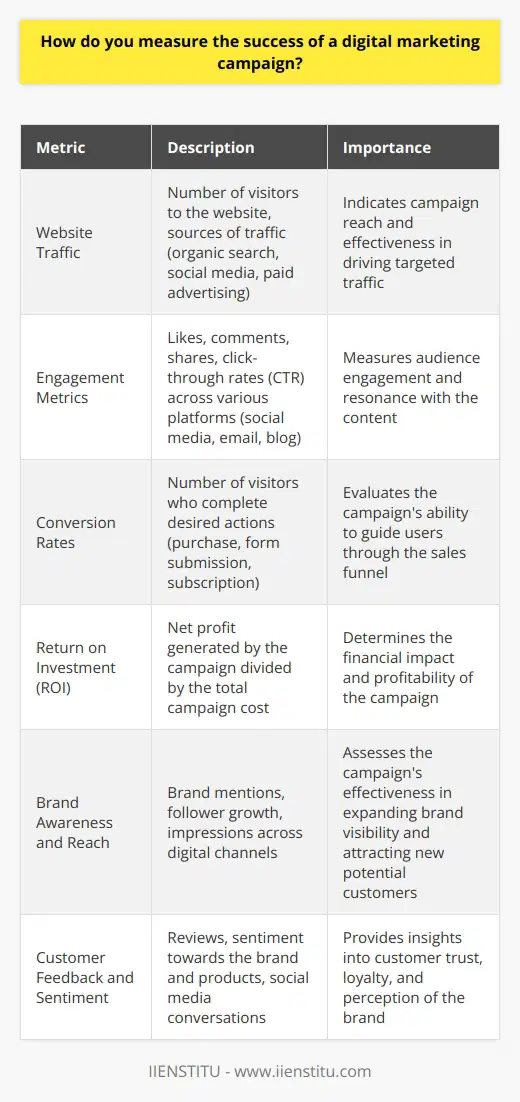
What are your strengths and weaknesses?
Identifying one's strengths and weaknesses is a crucial aspect of personal and professional development. Strengths are the qualities and skills that an individual excels in, while weaknesses are areas that need improvement. Recognizing these traits allows for a better understanding of oneself and helps in setting goals for growth.
Strengths
One of my primary strengths is my strong work ethic. I am dedicated to completing tasks efficiently and effectively. I possess excellent time management skills, which enable me to prioritize and meet deadlines consistently. Additionally, I am a quick learner and adapt well to new situations and challenges.
Another strength I possess is my ability to communicate effectively. I can articulate my thoughts and ideas clearly, both verbally and in writing. This skill proves invaluable when collaborating with others, as it facilitates the exchange of information and ensures that everyone is on the same page.
Problem-solving is another area in which I excel. I approach challenges with a logical and analytical mindset, breaking them down into smaller, manageable components. I am able to think critically and consider multiple perspectives when seeking solutions. This strength allows me to find innovative ways to overcome obstacles and achieve desired outcomes.
Weaknesses
Despite my strengths, I also acknowledge that I have weaknesses that I need to address. One of my weaknesses is my tendency to be a perfectionist. While striving for excellence is admirable, it can sometimes lead to spending too much time on a task, trying to make it flawless. I am working on finding a balance between producing high-quality work and knowing when to move on to the next task.
Another weakness I have identified is my reluctance to ask for help when needed. I have a strong sense of independence and often try to tackle challenges on my own. However, I have come to realize that seeking assistance from others can lead to more efficient problem-solving and personal growth. I am actively working on becoming more comfortable with reaching out for support when necessary.
Public speaking is an area that I find challenging. While I am confident in my ability to communicate in small groups, I experience nervousness when speaking in front of larger audiences. To overcome this weakness, I am actively seeking opportunities to practice public speaking and am working on techniques to manage my anxiety in these situations.
Conclusion
In conclusion, recognizing one's strengths and weaknesses is an ongoing process that requires self-reflection and a willingness to improve. By leveraging my strengths, such as my strong work ethic, effective communication skills, and problem-solving abilities, I can contribute positively to my personal and professional endeavors. Simultaneously, by acknowledging and addressing my weaknesses, including perfectionism, reluctance to seek help, and public speaking anxiety, I can continue to grow and develop as an individual.
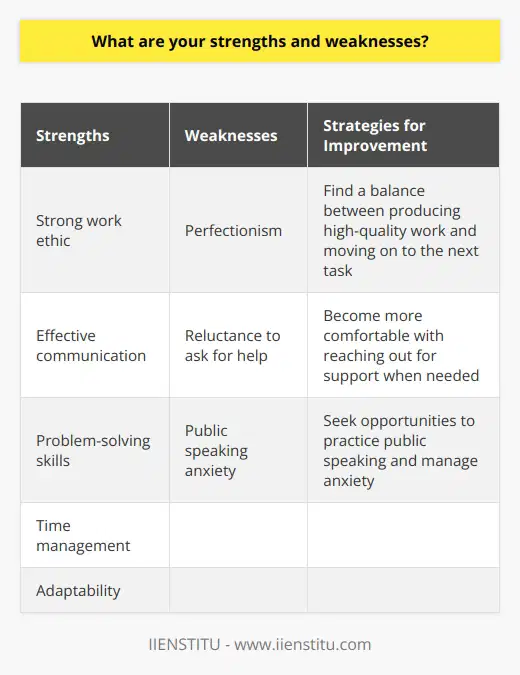
How do you stay up-to-date with the latest digital marketing trends?
Staying up-to-date with the latest digital marketing trends is crucial for professionals in the field. One effective way to stay informed is by regularly reading industry blogs and publications. These resources provide valuable insights into emerging technologies, best practices, and successful strategies. Attending conferences and webinars is another excellent method to learn from experts and network with peers. Social media platforms, such as LinkedIn and Twitter, are also useful for following thought leaders and joining relevant discussions. Subscribing to newsletters from reputable digital marketing companies can deliver the latest news and tips directly to your inbox. Continuously experimenting with new tools and techniques allows you to stay ahead of the curve and adapt to the ever-changing digital landscape.
Industry Blogs and Publications
Reading industry blogs and publications is a fundamental way to stay informed about digital marketing trends. These sources offer a wealth of information on various topics, from search engine optimization (SEO) to social media marketing. By dedicating time to reading these resources regularly, you can gain valuable insights into the latest strategies and best practices. Some popular industry blogs include Search Engine Journal, Marketing Land, and Social Media Examiner. These publications feature articles written by experienced professionals who share their knowledge and expertise. Incorporating this reading into your daily routine can help you stay up-to-date and inspired.
Conferences and Webinars
Attending conferences and webinars is another effective way to stay current with digital marketing trends. These events provide opportunities to learn from industry experts, ask questions, and network with peers. Many conferences, such as Content Marketing World and MozCon, offer a mix of keynote speeches, workshops, and panel discussions. Webinars are a convenient alternative for those who cannot attend in-person events. They allow you to learn from the comfort of your own office or home. By participating in these events, you can gain new perspectives, discover innovative strategies, and stay motivated to implement what you've learned.
Social Media Engagement
Social media platforms, particularly LinkedIn and Twitter, are valuable resources for staying up-to-date with digital marketing trends. Following thought leaders, joining relevant groups, and participating in discussions can expose you to new ideas and insights. LinkedIn is an excellent platform for connecting with other professionals in your field, sharing content, and engaging in meaningful conversations. Twitter is known for its real-time updates and is a great place to find the latest news and articles. By curating your social media feeds to include influential voices in digital marketing, you can stay informed and inspired.
Newsletters and Subscriptions
Subscribing to newsletters from reputable digital marketing companies is another way to stay current. These newsletters often contain a mix of industry news, tips, and case studies. By having this information delivered directly to your inbox, you can easily stay informed without having to seek out the information yourself. Some notable newsletters include the Google Analytics Newsletter, the HubSpot Marketing Blog Email Newsletter, and the Moz Top 10. These newsletters are typically curated by experts in the field and provide a quick and convenient way to stay up-to-date.
Experimentation and Implementation
Finally, staying up-to-date with digital marketing trends requires a willingness to experiment and implement new strategies. As new technologies and platforms emerge, it's essential to be open to trying them out. By testing new techniques and analyzing the results, you can determine what works best for your specific audience and goals. This hands-on approach to learning allows you to stay ahead of the curve and adapt to the ever-changing digital landscape. It's important to remember that not every trend will be relevant or effective for your business, so it's crucial to be strategic in your experimentation.
In conclusion, staying up-to-date with the latest digital marketing trends requires a multi-faceted approach. By reading industry blogs and publications, attending conferences and webinars, engaging on social media, subscribing to newsletters, and experimenting with new strategies, you can ensure that you remain informed and competitive in the field. Dedicating time to these activities and incorporating them into your regular routine will help you stay ahead of the curve and achieve success in your digital marketing efforts.
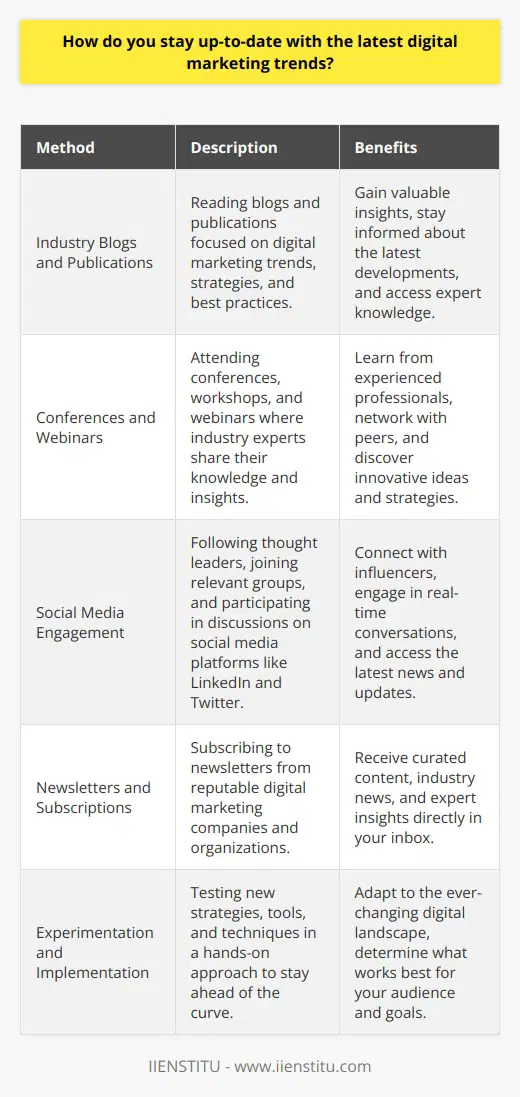
Can you describe a successful digital marketing campaign you have worked on and what made it effective?
One successful digital marketing campaign I have worked on was the launch of a new e-commerce website. The campaign aimed to drive traffic to the site and increase sales. We implemented a comprehensive strategy that included search engine optimization (SEO), pay-per-click (PPC) advertising, social media marketing, and email marketing.
Keyword Research and SEO
We began by conducting thorough keyword research to identify the most relevant and high-traffic keywords for the website. We then optimized the website's content, meta tags, and structure to improve its search engine rankings. This involved creating unique, high-quality content that incorporated the target keywords naturally.
PPC Advertising
To drive immediate traffic to the website, we launched a PPC campaign on Google Ads and Bing Ads. We created compelling ad copy and targeted the ads to specific demographics and geographic locations. We also implemented remarketing campaigns to target users who had previously visited the website.
Ad Copy Optimization
We continuously monitored the performance of the PPC ads and made adjustments to the ad copy and targeting. This allowed us to optimize the campaign for maximum ROI.
Social Media Marketing
We created a strong presence on social media platforms like Facebook, Instagram, and Twitter. We regularly posted engaging content, including product images, videos, and blog posts. We also ran social media ads to drive traffic to the website and increase brand awareness.
Influencer Partnerships
To further expand our reach on social media, we partnered with influencers in the relevant niche. They promoted our products to their followers, driving additional traffic and sales.
Email Marketing
We implemented an email marketing campaign to nurture leads and encourage repeat purchases. We segmented our email list based on user behavior and preferences, allowing us to send targeted, personalized emails. We also automated our email campaigns, triggering specific emails based on user actions.
A/B Testing
We conducted A/B testing on our email subject lines, content, and calls-to-action to optimize open rates and click-through rates. This helped us continually improve the effectiveness of our email marketing efforts.
Results and Key Takeaways
The digital marketing campaign was highly successful, resulting in a significant increase in website traffic and sales. Key factors that contributed to its effectiveness included:
Thorough keyword research and SEO optimization
Targeted PPC advertising with continuous optimization
Engaging social media content and influencer partnerships
Personalized and automated email marketing campaigns
Continuous testing and optimization of all campaign elements
By implementing a comprehensive, data-driven digital marketing strategy, we were able to achieve our goals and drive meaningful results for the e-commerce website.
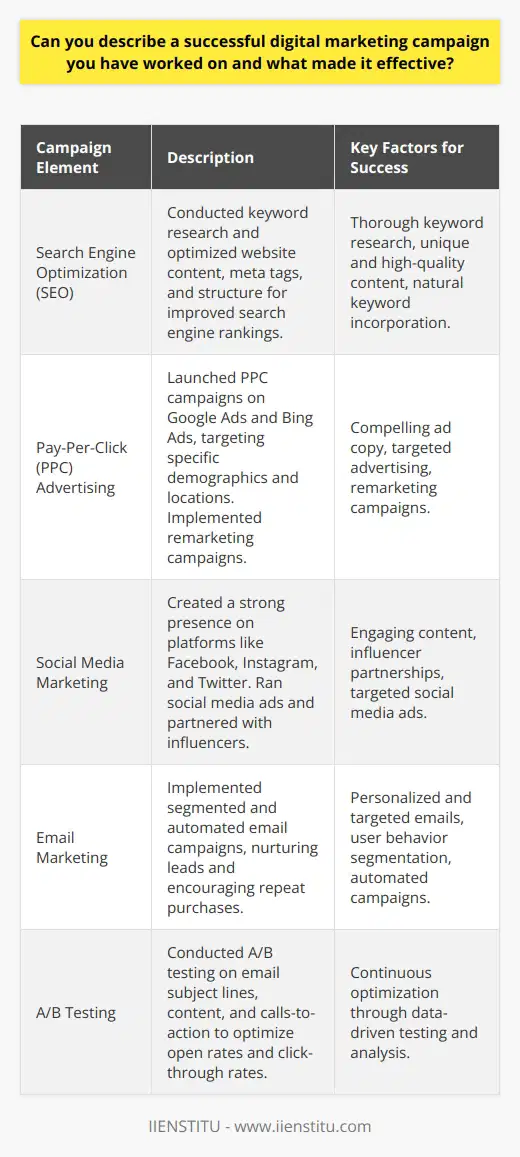
What are the most common digital marketing interview questions and their answers in PDF format?
Digital marketing interview questions often revolve around a candidate's knowledge of various digital marketing channels and strategies. Some of the most common questions include:
1. What is your experience with SEO?
Candidates should discuss their knowledge of keyword research, on-page optimization, link building, and other SEO best practices. They should provide examples of successful SEO campaigns they have worked on.
2. How do you measure the success of a digital marketing campaign?
Candidates should explain the key performance indicators (KPIs) they use to track the success of a campaign. These may include website traffic, conversion rates, engagement metrics, and ROI.
Common KPIs:
Website traffic
Conversion rates
Engagement metrics
Return on investment (ROI)
3. What is your experience with social media marketing?
Candidates should discuss their knowledge of various social media platforms and how they use them for marketing. They should provide examples of successful social media campaigns they have worked on.
Popular social media platforms for marketing:
Facebook
Instagram
Twitter
LinkedIn
4. How do you stay up-to-date with the latest digital marketing trends?
Candidates should discuss the resources they use to stay informed about the latest trends in digital marketing. These may include industry blogs, podcasts, conferences, and online courses.
Resources to stay updated:
Industry blogs
Podcasts
Conferences
Online courses
5. How do you approach content creation for digital marketing?
Candidates should discuss their process for creating engaging and effective content for digital marketing campaigns. They should emphasize the importance of understanding the target audience and creating content that resonates with them.
Content creation process:
Understand the target audience
Identify the main message
Choose the appropriate format
Create engaging and informative content
Optimize for search engines and social media
By preparing answers to these common digital marketing interview questions, candidates can demonstrate their knowledge and experience in the field. It is important to provide specific examples and discuss the strategies and techniques used to achieve success in digital marketing campaigns.
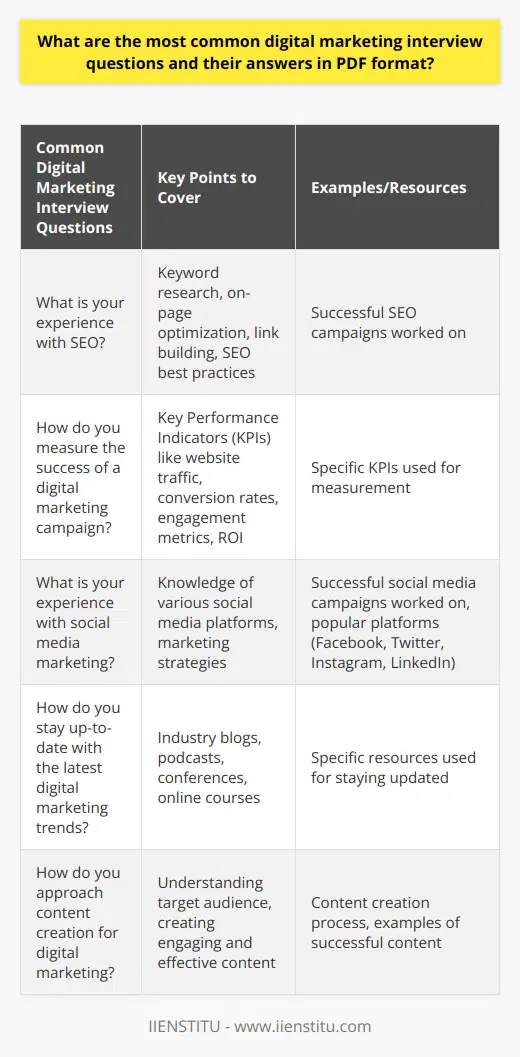
Where can I find a comprehensive PDF guide on digital marketing interview questions and answers?
Finding a comprehensive PDF guide on digital marketing interview questions and answers can be challenging. However, several online resources offer valuable information to help you prepare for your interview. One such resource is the website "Digital Marketing Interview Questions and Answers" by Simplilearn. This site provides a detailed overview of common questions asked during digital marketing interviews, along with sample answers and explanations.
Other Online Resources
In addition to Simplilearn, websites like Quora and Reddit have active digital marketing communities. These platforms allow you to ask questions and receive answers from experienced professionals in the field. You can also search for specific topics related to digital marketing interviews to find relevant discussions and insights.
Digital Marketing Blogs
Many digital marketing blogs also offer interview preparation materials. Sites like Moz, HubSpot, and Neil Patel's blog regularly publish articles on digital marketing best practices and trends. These articles can help you stay up-to-date on the latest developments in the industry and provide valuable talking points during your interview.
Online Courses and Certifications
Taking online courses or earning certifications in digital marketing can also boost your interview preparedness. Platforms like Coursera, Udemy, and Google Digital Garage offer a wide range of courses on various aspects of digital marketing. These courses often include quizzes and assignments that can help you practice answering interview questions and demonstrate your knowledge to potential employers.
Networking and Mentorship
Networking with professionals in the digital marketing industry can also provide valuable insights into the interview process. Attend industry events, join online forums, and connect with digital marketers on LinkedIn to expand your network. You may also consider seeking out a mentor who can guide you through the interview process and offer personalized advice based on their experience.
Practice and Preparation
Ultimately, the key to acing your digital marketing interview is practice and preparation. Review common interview questions, practice your answers, and be ready to provide examples of your work and accomplishments. By combining the resources mentioned above with consistent practice, you'll be well-equipped to impress your interviewer and land your dream digital marketing job.
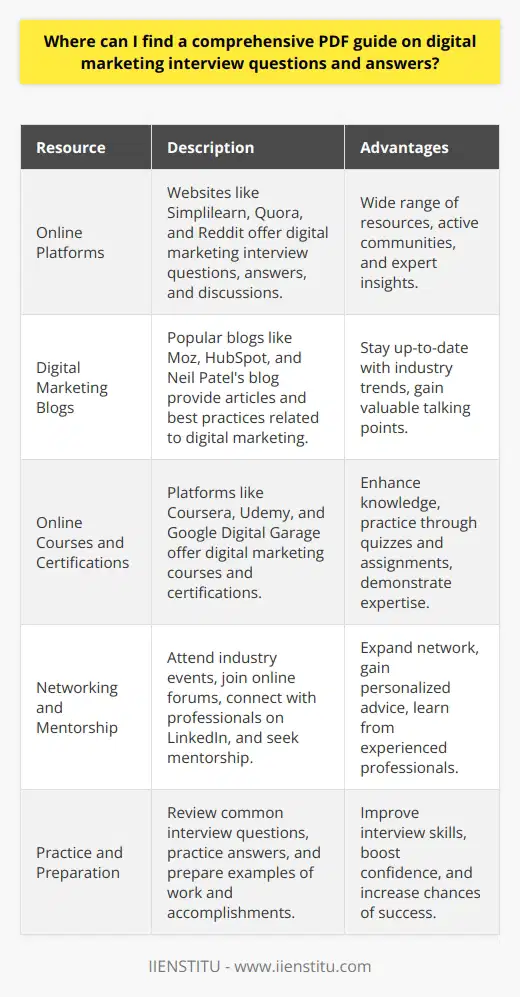
How can I prepare for a digital marketing interview using a PDF resource with questions and answers?
Preparing for a digital marketing interview using a PDF resource with questions and answers can be an effective strategy. By reviewing the material, you can familiarize yourself with common topics and gain confidence in your responses. The PDF likely covers a wide range of subjects, such as SEO, social media marketing, email campaigns, and analytics. Studying these areas will help you demonstrate your knowledge and understanding of digital marketing principles during the interview.
Familiarize Yourself with the Content
Begin by thoroughly reading through the PDF, taking notes on key concepts, terminology, and examples. Pay attention to the questions and their corresponding answers, as these will give you an idea of what to expect in the interview. If you come across any unfamiliar terms or concepts, take the time to research and understand them. This will help you provide well-informed and articulate responses during the interview.
Practice Answering Questions
Once you have a solid grasp of the content, practice answering the questions aloud. This will help you develop concise and coherent responses, while also improving your confidence and communication skills. Consider recording yourself or practicing with a friend to receive feedback on your answers. Focus on providing relevant examples and showcasing your problem-solving abilities when addressing each question.
Stay Up-to-Date with Industry Trends
In addition to studying the PDF, stay informed about the latest digital marketing trends and developments. Read industry blogs, follow thought leaders on social media, and attend webinars or online courses. Incorporating current trends and best practices into your answers will demonstrate your passion and dedication to the field. This knowledge will also help you engage in meaningful discussions with the interviewer and ask pertinent questions.
Tailor Your Answers to the Company
Research the company you are interviewing with and tailor your answers to their specific needs and goals. Visit their website, read their blog, and explore their social media presence to gain insights into their digital marketing strategies. When answering questions, provide examples that align with the company's industry and target audience. This will show the interviewer that you have taken the time to understand their business and can contribute to their success.
Prepare Questions for the Interviewer
Engaging with the interviewer by asking thoughtful questions demonstrates your interest in the position and the company. Use the PDF as a starting point to develop questions related to the company's digital marketing objectives, challenges, and opportunities. Inquire about their target audience, key performance indicators, and the role you would play in achieving their goals. This dialogue will not only provide you with valuable information but also leave a lasting impression on the interviewer.
Conclusion
By leveraging a PDF resource with questions and answers, you can effectively prepare for a digital marketing interview. Familiarize yourself with the content, practice answering questions, stay current with industry trends, tailor your responses to the company, and prepare insightful questions for the interviewer. This comprehensive approach will help you showcase your knowledge, skills, and enthusiasm for the role, increasing your chances of success in the interview process.
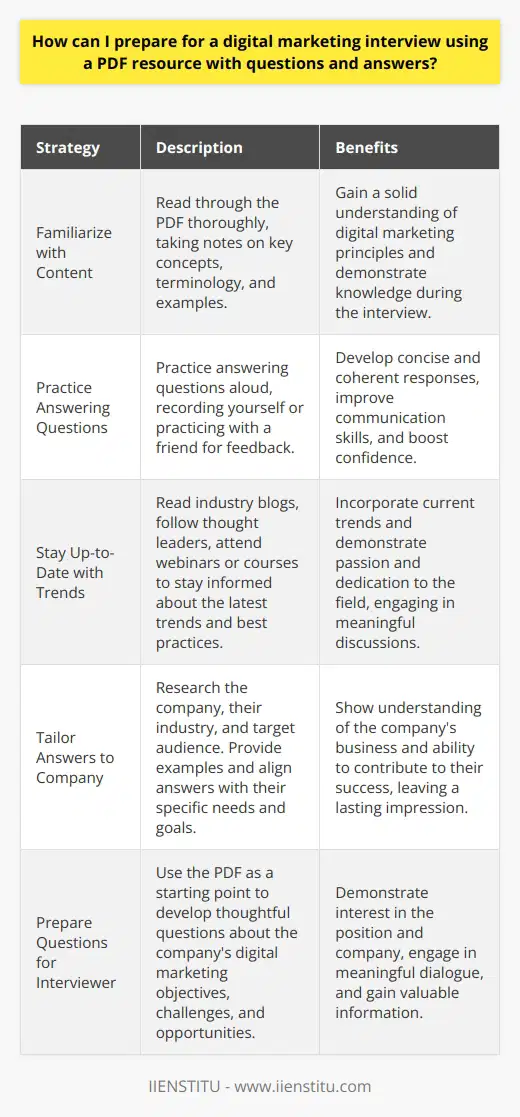
What is your experience with global digital marketing campaigns and their impact on brand awareness?
Global digital marketing campaigns have become increasingly crucial for businesses to expand their reach and boost brand awareness. These campaigns leverage various online channels, such as social media, email marketing, and search engine optimization, to engage with target audiences worldwide. By crafting compelling content and utilizing data-driven strategies, companies can effectively communicate their brand message and values to a diverse global market.
The Impact of Global Digital Marketing Campaigns
One of the primary benefits of global digital marketing campaigns is their ability to significantly enhance brand awareness. Through targeted advertising and content distribution, businesses can reach potential customers across different countries and cultures. This exposure helps build brand recognition and establishes a strong online presence, which is essential in today's competitive digital landscape.
Increased Engagement and Customer Interaction
Global digital marketing campaigns also facilitate increased engagement and customer interaction. Social media platforms, in particular, allow brands to connect with their audience on a more personal level. By actively participating in online conversations, responding to customer inquiries, and sharing valuable content, companies can foster a sense of community and loyalty among their global customer base.
Data-Driven Insights and Personalization
Another significant aspect of global digital marketing campaigns is the ability to gather data-driven insights and personalize content. Through advanced analytics tools, businesses can track customer behavior, preferences, and engagement patterns across different regions. This information enables marketers to tailor their campaigns to specific target audiences, ensuring that the right message reaches the right people at the right time.
Challenges and Considerations
While global digital marketing campaigns offer numerous benefits, there are also challenges and considerations to keep in mind. Cultural differences, language barriers, and varying digital infrastructure across countries can impact the effectiveness of these campaigns. It is crucial for businesses to conduct thorough research and adapt their strategies to accommodate local preferences and sensitivities.
Localization and Adaptation
To overcome cultural and linguistic challenges, businesses should prioritize localization and adaptation in their global digital marketing efforts. This involves translating content into relevant languages, considering local customs and traditions, and adjusting visual elements to resonate with specific audiences. By demonstrating cultural sensitivity and understanding, brands can build trust and credibility among their global customers.
Measuring Success and ROI
Measuring the success and return on investment (ROI) of global digital marketing campaigns is essential for businesses. Key performance indicators (KPIs) such as website traffic, engagement rates, lead generation, and conversion rates help assess the effectiveness of these campaigns. By regularly monitoring and analyzing these metrics, marketers can optimize their strategies and allocate resources more efficiently to maximize brand awareness and achieve desired outcomes.
Conclusion
In conclusion, global digital marketing campaigns have the power to significantly impact brand awareness and reach diverse audiences worldwide. By leveraging various online channels, crafting compelling content, and adopting data-driven approaches, businesses can effectively engage with their target markets and build strong brand recognition. However, it is essential to consider cultural differences, prioritize localization, and continuously measure and optimize campaign performance to ensure long-term success in the global digital landscape.
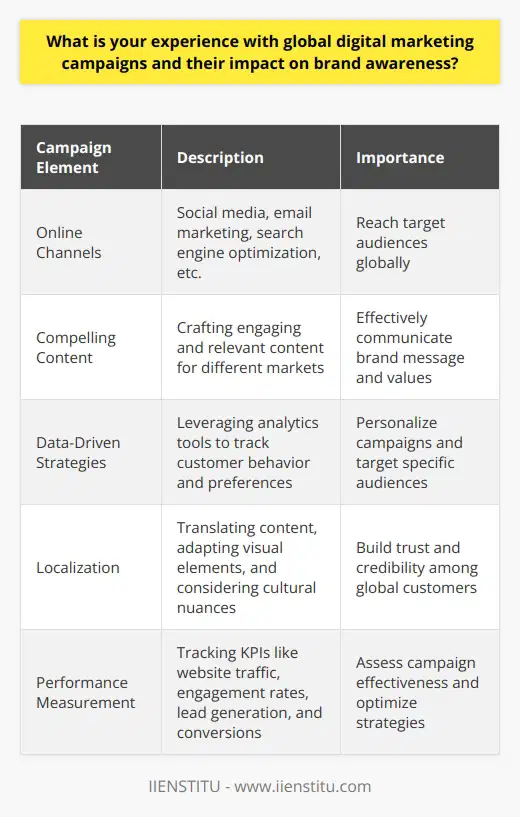
How do you stay up-to-date with the latest trends and best practices in global digital marketing?
Staying up-to-date with the latest trends and best practices in global digital marketing is crucial for success. One effective method is to regularly read industry blogs and publications from reputable sources. These resources provide valuable insights into emerging technologies, consumer behavior shifts, and innovative marketing strategies. Attending digital marketing conferences and webinars is another excellent way to stay informed. These events offer opportunities to learn from experts, network with peers, and gain exposure to cutting-edge ideas and case studies. Additionally, following influential thought leaders on social media platforms can help you stay current with the latest discussions and developments in the field.
Continuous Learning and Skill Development
To remain competitive in the ever-evolving digital marketing landscape, it is essential to prioritize continuous learning and skill development. Engaging in online courses, workshops, and certification programs can help you acquire new knowledge and master the latest tools and techniques. Many reputable institutions and organizations offer comprehensive digital marketing curricula that cover topics such as search engine optimization (SEO), social media marketing, content marketing, and data analytics. By investing in your education and staying committed to lifelong learning, you can ensure that your skills remain relevant and adaptable to the changing demands of the industry.
Collaboration and Knowledge Sharing
Collaborating with peers and participating in professional communities is another valuable strategy for staying up-to-date in global digital marketing. Joining online forums, discussion groups, and social media communities dedicated to digital marketing allows you to engage in meaningful conversations, seek advice, and share experiences with like-minded professionals. These interactions can provide valuable insights into real-world challenges, best practices, and innovative solutions. Additionally, participating in cross-functional teams within your organization can expose you to diverse perspectives and foster a culture of knowledge sharing and continuous improvement.
Data-Driven Insights and Experimentation
Leveraging data-driven insights and adopting a culture of experimentation are key to staying ahead in global digital marketing. Regularly analyzing performance metrics, customer feedback, and market research can help you identify trends, optimize campaigns, and make informed decisions. By embracing a data-driven approach, you can gain a deeper understanding of your target audience, their preferences, and behaviors, enabling you to deliver more personalized and effective marketing experiences. Furthermore, conducting controlled experiments, such as A/B testing, can help you validate hypotheses, refine strategies, and identify the most impactful tactics for your specific market and goals.
Adaptability and Agility
In the rapidly evolving digital marketing landscape, adaptability and agility are essential qualities for staying up-to-date. Being open to change, willing to experiment with new approaches, and able to quickly pivot strategies based on data-driven insights are crucial for success. Embracing a growth mindset, where challenges are viewed as opportunities for learning and innovation, can help you stay resilient and responsive to the ever-changing demands of the industry. By fostering a culture of continuous improvement, encouraging calculated risk-taking, and empowering your team to think creatively, you can position yourself and your organization to thrive in the dynamic world of global digital marketing.
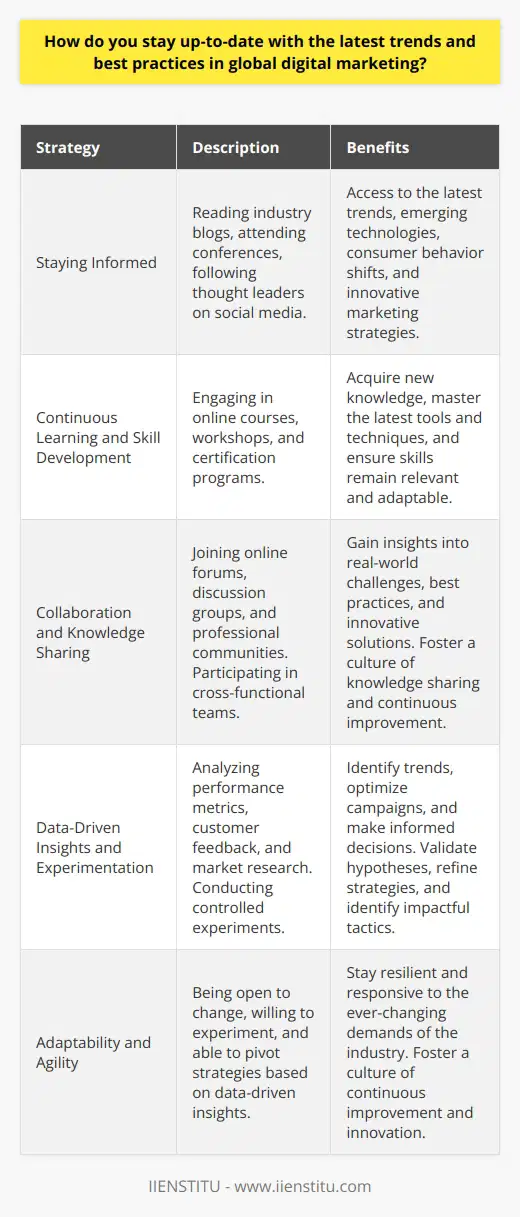
In your opinion, what are the most important metrics to track when measuring the success of a global digital marketing strategy?
When measuring the success of a global digital marketing strategy, several key metrics should be tracked and analyzed. These metrics provide valuable insights into the effectiveness of the marketing efforts and help identify areas for improvement. Let's explore some of the most crucial metrics to consider.
Website Traffic
Website traffic is a fundamental metric to monitor when assessing a digital marketing strategy's success. It indicates how many people are visiting the website and engaging with the content. Tools like Google Analytics can provide detailed information on website traffic, including the number of unique visitors, pageviews, and bounce rates. Analyzing traffic sources, such as organic search, social media, and referral links, can help determine which channels are driving the most visitors to the website.
Conversion Rates
Conversion rates measure the percentage of website visitors who take a desired action, such as making a purchase, filling out a form, or subscribing to a newsletter. Tracking conversion rates is essential to understand how effectively the website and marketing campaigns are persuading visitors to engage with the brand. By optimizing landing pages, calls-to-action, and user experience, marketers can improve conversion rates and achieve better results from their digital marketing efforts.
Engagement Metrics
Engagement metrics provide insights into how users interact with the brand's digital content. These metrics include time spent on the website, pages per session, and social media interactions (likes, comments, shares). High engagement levels indicate that the content resonates with the target audience and encourages them to spend more time exploring the brand's offerings. Regularly monitoring and analyzing engagement metrics can help refine content strategies and improve user experience.
Customer Acquisition Cost (CAC)
Customer Acquisition Cost (CAC) measures the total cost of acquiring a new customer through digital marketing efforts. It takes into account various expenses, such as advertising spend, content creation, and marketing team salaries. Monitoring CAC helps determine the cost-effectiveness of the marketing strategy and identifies opportunities to optimize spending. By comparing CAC to the lifetime value of a customer, marketers can ensure that their acquisition efforts are generating a positive return on investment.
Return on Investment (ROI)
Return on Investment (ROI) is a critical metric that measures the profitability of a digital marketing campaign. It compares the revenue generated from the campaign to the total cost invested. Tracking ROI helps justify marketing spending and enables data-driven decision-making. By continuously monitoring ROI, marketers can identify high-performing campaigns and allocate resources accordingly to maximize profitability.
Brand Awareness and Reach
Brand awareness and reach are important metrics to consider when evaluating a global digital marketing strategy. These metrics assess how well the brand is recognized and how far its message is spreading. Tools like social media analytics and brand mention tracking can provide valuable data on brand awareness and reach. By monitoring these metrics, marketers can gauge the effectiveness of their branding efforts and make necessary adjustments to expand their audience.
In conclusion, measuring the success of a global digital marketing strategy requires tracking a combination of key metrics. Website traffic, conversion rates, engagement metrics, customer acquisition cost, return on investment, and brand awareness are among the most crucial indicators to monitor. By regularly analyzing these metrics and making data-driven decisions, marketers can optimize their strategies, allocate resources effectively, and achieve long-term success in the global digital landscape.
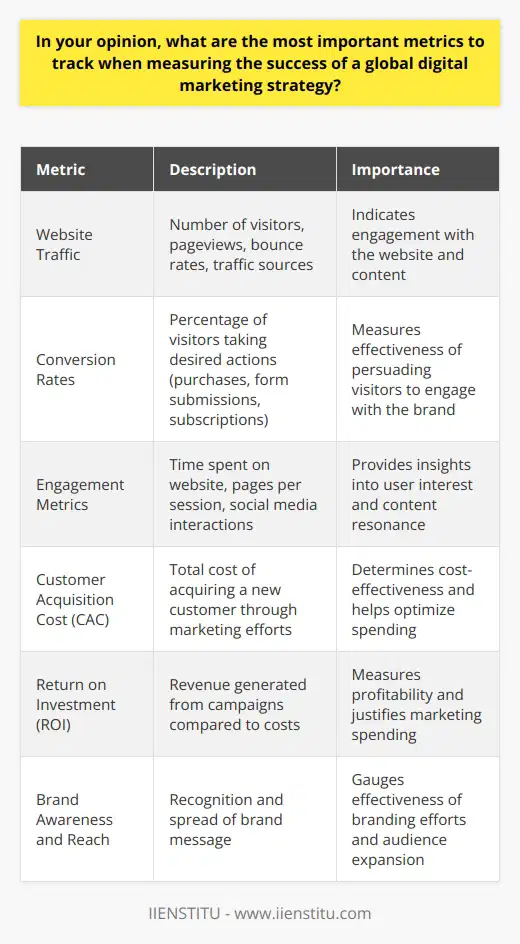
What experience do you have with global digital marketing?
Global digital marketing encompasses a wide range of strategies and tactics employed to reach audiences worldwide. As a marketing professional, I have gained significant experience in this field through various projects and initiatives. My expertise includes developing and executing comprehensive digital marketing campaigns that target specific geographic regions and demographics.
Search Engine Optimization (SEO)
One of the key aspects of global digital marketing is search engine optimization (SEO). I have worked extensively on optimizing websites and content to improve their visibility in search engine results pages (SERPs) across different countries and languages. This involves conducting thorough keyword research, analyzing competitor strategies, and implementing on-page and off-page SEO techniques to enhance organic rankings and drive targeted traffic.
Pay-Per-Click (PPC) Advertising
In addition to SEO, I have managed numerous pay-per-click (PPC) advertising campaigns on global platforms such as Google Ads, Bing Ads, and social media networks. I have experience in creating compelling ad copy, selecting relevant keywords, and optimizing landing pages to maximize conversions. By leveraging geo-targeting and language-specific ad groups, I have successfully reached international audiences and achieved desired marketing goals.
Social Media Marketing
Social media plays a crucial role in global digital marketing. I have developed and executed social media strategies tailored to different markets and cultures. This includes creating engaging content, managing social media profiles, and conducting community management across various platforms. By understanding the unique preferences and behaviors of users in different regions, I have effectively built brand awareness and fostered meaningful interactions with global audiences.
Content Localization
To effectively engage with global audiences, I have experience in content localization. This involves adapting marketing materials, such as website content, blog posts, and promotional messages, to suit the linguistic and cultural nuances of different markets. By collaborating with translation professionals and local marketing teams, I have ensured that the content resonates with the target audience and aligns with their preferences and expectations.
Email Marketing
Email marketing is another powerful tool in global digital marketing. I have designed and implemented email campaigns that cater to international subscribers. This includes segmenting email lists based on geographic location, language, and interests to deliver personalized and relevant content. By optimizing email templates, subject lines, and calls-to-action, I have achieved higher open rates, click-through rates, and conversions in different markets.
Analytics and Reporting
To measure the success of global digital marketing efforts, I have expertise in utilizing analytics tools and generating comprehensive reports. I have worked with platforms like Google Analytics, Adobe Analytics, and social media analytics to track key performance indicators (KPIs) across different regions and channels. By analyzing data and identifying trends, I have provided actionable insights and recommendations to optimize marketing strategies and improve overall performance.
Overall, my experience in global digital marketing encompasses a wide range of disciplines, including SEO, PPC advertising, social media marketing, content localization, email marketing, and analytics. By leveraging these skills and staying updated with the latest industry trends, I have successfully developed and executed effective digital marketing strategies that have driven growth and engagement for businesses on a global scale.

Can you describe a digital marketing campaign you worked on that targeted an international audience?
Developing a digital marketing campaign targeting an international audience requires careful planning and execution. One such campaign I worked on aimed to promote a mobile application across multiple countries. The campaign's objective was to increase app downloads and user engagement in target markets.
Market Research and Localization
The first step was to conduct thorough market research to understand the unique preferences and behaviors of each target country. This research helped us identify the most popular social media platforms, search engines, and content formats in each market. Based on these insights, we developed a localized content strategy that resonated with the audience in each country.
Localization involved adapting the campaign's messaging, visuals, and content to suit the cultural nuances of each market. We collaborated with native speakers and local marketing experts to ensure that our translations and content were accurate and culturally appropriate.
Multichannel Approach
To maximize reach and engagement, we implemented a multichannel approach that leveraged various digital marketing tactics. These tactics included:
Search Engine Optimization (SEO)
We optimized the app's website and landing pages for relevant keywords in each target country's language. This optimization helped improve the app's visibility in local search engine results.
Social Media Marketing
We created country-specific social media accounts and developed tailored content for each platform. Our social media strategy focused on engaging with local influencers, running targeted ads, and encouraging user-generated content.
Influencer Partnerships
Collaborating with local influencers and thought leaders helped us gain credibility and reach in each market. We partnered with influencers who aligned with the app's values and had a strong following in our target countries.
Performance Monitoring and Optimization
Throughout the campaign, we closely monitored key performance indicators (KPIs) such as app downloads, user engagement, and conversion rates. We used analytics tools to track the campaign's performance in real-time and made data-driven optimizations to improve results.
For example, if we noticed that a particular ad creative or messaging was not resonating with the audience in a specific country, we quickly adapted and tested new variations. This agile approach allowed us to continuously refine our strategies and allocate resources to the most effective channels and tactics.
Results and Lessons Learned
The international digital marketing campaign was successful in achieving its objectives. We observed a significant increase in app downloads and user engagement across all target markets. The localized content and multichannel approach proved effective in capturing the attention of the international audience.
One of the key lessons learned from this campaign was the importance of cultural sensitivity and adaptation. What works in one country may not necessarily work in another. It is crucial to invest time and resources in understanding the unique characteristics of each market and tailoring the campaign accordingly.
Another valuable takeaway was the significance of continuous monitoring and optimization. In a dynamic digital landscape, it is essential to be agile and responsive to changes in audience behavior and market trends. Regular data analysis and iteration helped us stay ahead of the curve and maximize the campaign's impact.
In conclusion, running an international digital marketing campaign requires a strategic and adaptable approach. By conducting thorough market research, localizing content, leveraging multiple channels, and continuously monitoring and optimizing performance, we were able to successfully promote the mobile application and engage with the international audience.
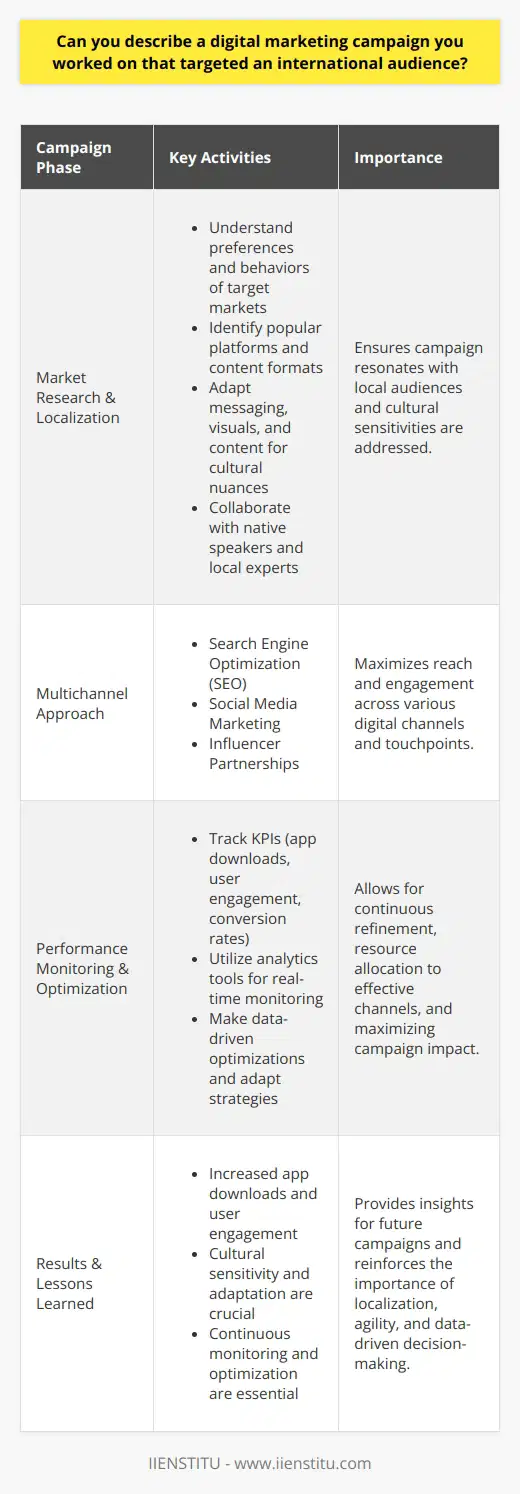
How do you stay up-to-date with the latest global digital marketing trends and best practices?
Staying up-to-date with the latest global digital marketing trends and best practices is crucial for marketers. It enables them to adapt to the ever-changing digital landscape and maintain a competitive edge. Marketers can employ various strategies to stay informed about the latest developments in the field.
Attend Industry Conferences and Webinars
Attending industry conferences and webinars is an excellent way to learn about the latest digital marketing trends. These events bring together experts from around the world to share their insights and experiences. Marketers can learn about new technologies, strategies, and best practices that they can apply in their work.
Follow Industry Blogs and Publications
Following industry blogs and publications is another effective way to stay informed about the latest digital marketing trends. Many reputable sources, such as Marketing Land, Search Engine Journal, and Social Media Examiner, regularly publish articles on the latest developments in the field. Marketers can subscribe to these publications and receive updates directly in their inbox.
Engage with Online Communities
Engaging with online communities, such as LinkedIn groups and forums, can also help marketers stay up-to-date. These communities bring together professionals from around the world to discuss the latest trends and challenges in digital marketing. Marketers can participate in these discussions, ask questions, and learn from the experiences of others.
Experiment with New Technologies and Platforms
Experimenting with new technologies and platforms is another way to stay ahead of the curve. Marketers can try out new tools and platforms to see how they can be used to improve their digital marketing efforts. By being an early adopter, marketers can gain a competitive advantage and stay ahead of the competition.
Analyze Competitor Strategies
Analyzing competitor strategies can also provide valuable insights into the latest digital marketing trends. Marketers can study the strategies used by their competitors to see what is working and what is not. They can then adapt these strategies to their own campaigns to improve their results.
Continuously Educate Oneself
Finally, continuously educating oneself is essential for staying up-to-date with the latest digital marketing trends. Marketers can take online courses, attend workshops, and read books to expand their knowledge and skills. By investing in their own education, marketers can stay ahead of the curve and deliver better results for their clients.
In conclusion, staying up-to-date with the latest global digital marketing trends and best practices is essential for marketers. By attending industry conferences and webinars, following industry blogs and publications, engaging with online communities, experimenting with new technologies and platforms, analyzing competitor strategies, and continuously educating oneself, marketers can stay informed and adapt to the ever-changing digital landscape.
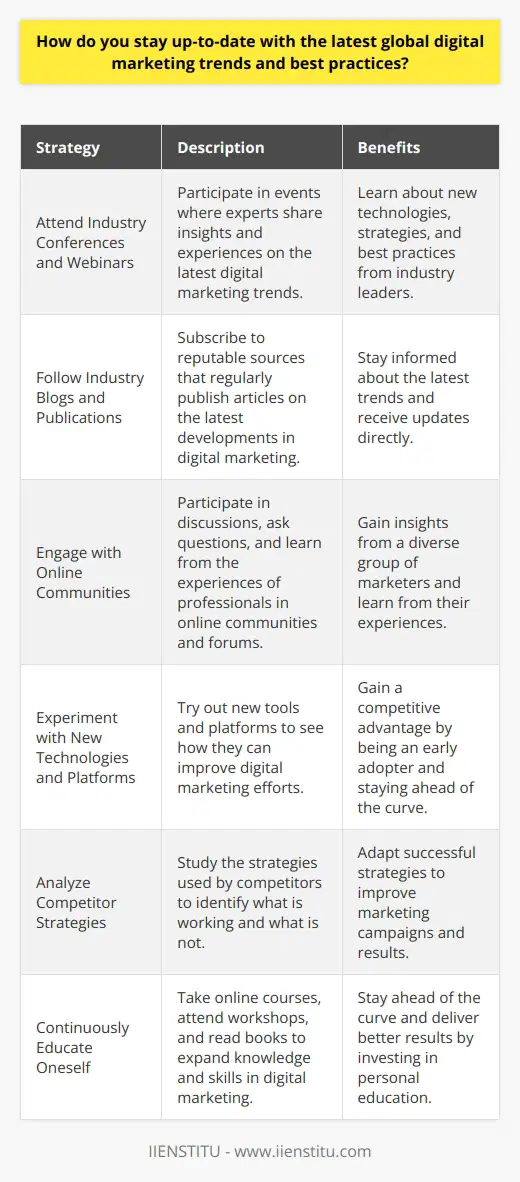
What are the key components of a successful digital marketing strategy?
A successful digital marketing strategy encompasses several key components that work together to achieve business objectives. These components include a well-defined target audience, clear goals and objectives, and a comprehensive approach to reaching and engaging potential customers across various digital channels.
Defining Your Target Audience
The foundation of any successful digital marketing strategy is a deep understanding of your target audience. This involves researching and identifying the demographics, interests, and behaviors of your ideal customer. By creating detailed buyer personas, you can tailor your marketing efforts to effectively reach and resonate with your target audience.
Conducting Market Research
To gain insights into your target audience, conduct thorough market research. Use tools like surveys, focus groups, and analytics to gather data on your audience's preferences, pain points, and online behaviors. This information will guide your marketing decisions and help you create content that addresses their needs and interests.
Setting Clear Goals and Objectives
A successful digital marketing strategy requires clear, measurable goals and objectives. These goals should align with your overall business objectives and be specific, achievable, and time-bound. Examples of digital marketing goals include increasing website traffic, generating leads, improving conversion rates, and building brand awareness.
Defining Key Performance Indicators (KPIs)
To track the success of your digital marketing efforts, define key performance indicators (KPIs). KPIs are measurable values that demonstrate progress towards your goals. They can include metrics such as website visits, click-through rates, social media engagement, and conversion rates. Regularly monitoring and analyzing your KPIs will help you optimize your strategy and make data-driven decisions.
Developing a Multi-Channel Approach
A successful digital marketing strategy leverages multiple channels to reach and engage your target audience. This multi-channel approach includes tactics such as search engine optimization (SEO), pay-per-click (PPC) advertising, social media marketing, email marketing, and content marketing. By using a combination of these channels, you can maximize your reach and create a cohesive brand experience across various touchpoints.
Creating Valuable Content
Content is a crucial component of any digital marketing strategy. It helps attract, engage, and convert your target audience. Develop a content strategy that focuses on creating valuable, informative, and entertaining content that addresses your audience's needs and interests. This can include blog posts, videos, infographics, case studies, and social media posts.
Optimizing for Search Engines
To ensure your content is easily discoverable by your target audience, optimize it for search engines. Conduct keyword research to identify relevant terms and phrases your audience uses when searching for products or services like yours. Incorporate these keywords naturally into your content, meta tags, and headings to improve your search engine rankings and drive organic traffic to your website.
Measuring and Analyzing Results
To continually improve your digital marketing strategy, regularly measure and analyze your results. Use web analytics tools to track your website traffic, user behavior, and conversion rates. Monitor your social media metrics to gauge engagement and reach. Analyze your email marketing campaigns to measure open rates, click-through rates, and conversions.
Conducting A/B Testing
A/B testing is a powerful technique for optimizing your digital marketing efforts. It involves creating two versions of a web page, email, or advertisement and testing them with different segments of your audience. By analyzing the results, you can determine which version performs better and make data-driven improvements to your strategy.
Continuously Adapting and Improving
The digital marketing landscape is constantly evolving, and a successful strategy requires continuous adaptation and improvement. Stay up-to-date with the latest trends, technologies, and best practices in digital marketing. Regularly review your performance data and make adjustments to your tactics based on what's working and what's not. By embracing a culture of continuous learning and optimization, you can stay ahead of the competition and achieve long-term success.
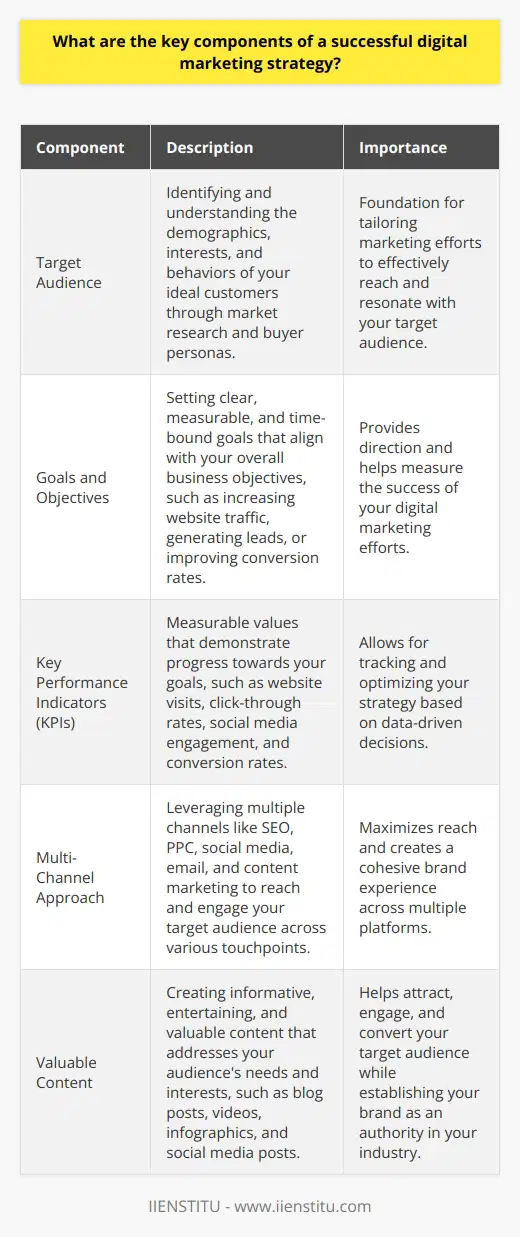
What metrics should be used to measure the effectiveness of digital marketing efforts?
Measuring the effectiveness of digital marketing efforts is crucial for businesses to optimize their strategies and allocate resources efficiently. Several key performance indicators (KPIs) can be used to assess the success of digital marketing campaigns.
Website Traffic
Website traffic is a fundamental metric that indicates the number of visitors attracted to a website through digital marketing efforts. Tools like Google Analytics can help track website traffic, including unique visitors, page views, and bounce rates. An increase in website traffic suggests that digital marketing strategies are effectively driving audience engagement.
Conversion Rates
Conversion rates measure the percentage of website visitors who take desired actions, such as making a purchase or filling out a form. High conversion rates indicate that digital marketing efforts are not only attracting visitors but also encouraging them to engage with the brand and take action. Tracking conversion rates helps businesses identify the most effective marketing channels and optimize their strategies accordingly.
Cost per Acquisition (CPA)
CPA measures the average cost of acquiring a new customer through digital marketing efforts. It is calculated by dividing the total marketing spend by the number of new customers acquired. Monitoring CPA helps businesses assess the cost-effectiveness of their digital marketing campaigns and make data-driven decisions to optimize their budget allocation.
Return on Investment (ROI)
ROI is a critical metric that measures the profitability of digital marketing efforts. It is calculated by dividing the net profit generated by the marketing campaign by the total marketing spend. A positive ROI indicates that the digital marketing strategy is generating more revenue than the cost incurred, while a negative ROI suggests the need for optimization or reevaluation of the marketing approach.
Engagement Metrics
Engagement metrics, such as likes, shares, comments, and click-through rates (CTR), provide insights into how the target audience interacts with digital marketing content. High engagement rates indicate that the content resonates with the audience and encourages them to take action. Tracking engagement metrics helps businesses identify the type of content that generates the most interest and adjust their strategies accordingly.
Customer Lifetime Value (CLV)
CLV measures the total revenue a customer is expected to generate throughout their relationship with a business. By tracking CLV, businesses can assess the long-term impact of their digital marketing efforts on customer loyalty and revenue growth. Focusing on increasing CLV helps businesses optimize their marketing strategies to attract and retain high-value customers.
Brand Awareness
Brand awareness metrics, such as social media followers, brand mentions, and search engine rankings, indicate the reach and visibility of a brand in the digital space. Increasing brand awareness through digital marketing efforts helps businesses establish a strong online presence and attract new customers. Tracking brand awareness metrics allows businesses to gauge the effectiveness of their branding strategies and make necessary adjustments.
To effectively measure the success of digital marketing efforts, businesses should use a combination of these metrics and regularly monitor their performance. By analyzing data and insights provided by these KPIs, businesses can make informed decisions to optimize their digital marketing strategies, allocate resources effectively, and ultimately drive business growth.
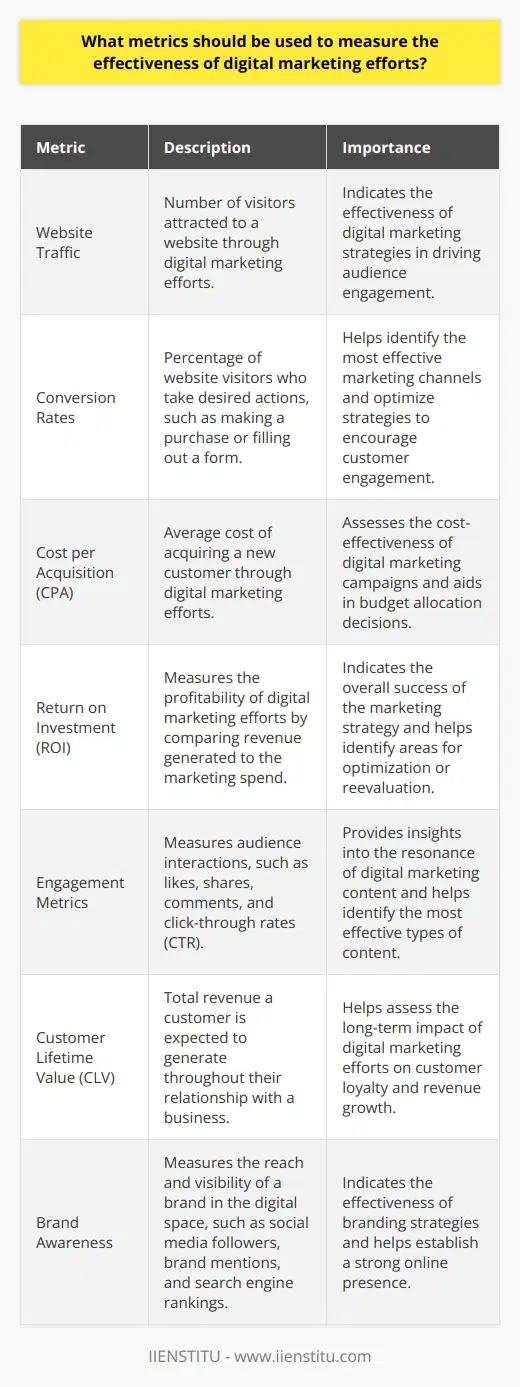
What is your experience with developing and implementing global digital marketing strategies?
Developing and implementing global digital marketing strategies requires a comprehensive understanding of target markets, cultural nuances, and technological landscapes. It involves conducting thorough research to identify the unique characteristics, preferences, and behaviors of different audience segments across various regions. This research forms the foundation for creating tailored marketing campaigns that resonate with specific cultural contexts while maintaining brand consistency.
Adapting to Local Markets
One crucial aspect of global digital marketing is adapting strategies to local markets. This involves localizing content, messaging, and visuals to ensure they are relevant and appealing to each target audience. Effective localization goes beyond mere translation; it requires a deep understanding of cultural references, idioms, and social norms. By creating content that speaks directly to the local audience, brands can establish a stronger connection and build trust.
Leveraging Digital Channels
Implementing global digital marketing strategies involves leveraging various digital channels to reach target audiences effectively. This includes optimizing websites for international search engines, utilizing social media platforms popular in specific regions, and employing targeted advertising campaigns. It is essential to consider the unique digital ecosystems of each market, as user behavior and platform preferences can vary significantly across countries.
Measuring and Optimizing Performance
To ensure the success of global digital marketing strategies, it is crucial to establish clear metrics and key performance indicators (KPIs). These metrics should align with the overall business objectives and be tailored to each market. Regular monitoring and analysis of campaign performance allow for data-driven optimizations and refinements. By continuously testing, learning, and adapting, marketers can improve the effectiveness of their strategies and maximize return on investment (ROI).
Collaboration and Local Expertise
Developing and implementing global digital marketing strategies often requires collaboration with local teams and partners. These local experts bring valuable insights into market-specific nuances, consumer behavior, and cultural sensitivities. By fostering strong partnerships and open communication, marketers can ensure that their strategies are executed effectively and resonate with the intended audiences.
Successful global digital marketing strategies strike a balance between maintaining brand consistency and adapting to local market dynamics. They require a holistic approach that considers cultural differences, technological infrastructure, and consumer preferences. By conducting thorough research, leveraging appropriate digital channels, measuring performance, and collaborating with local experts, marketers can create impactful campaigns that drive engagement, build brand loyalty, and achieve business objectives on a global scale.
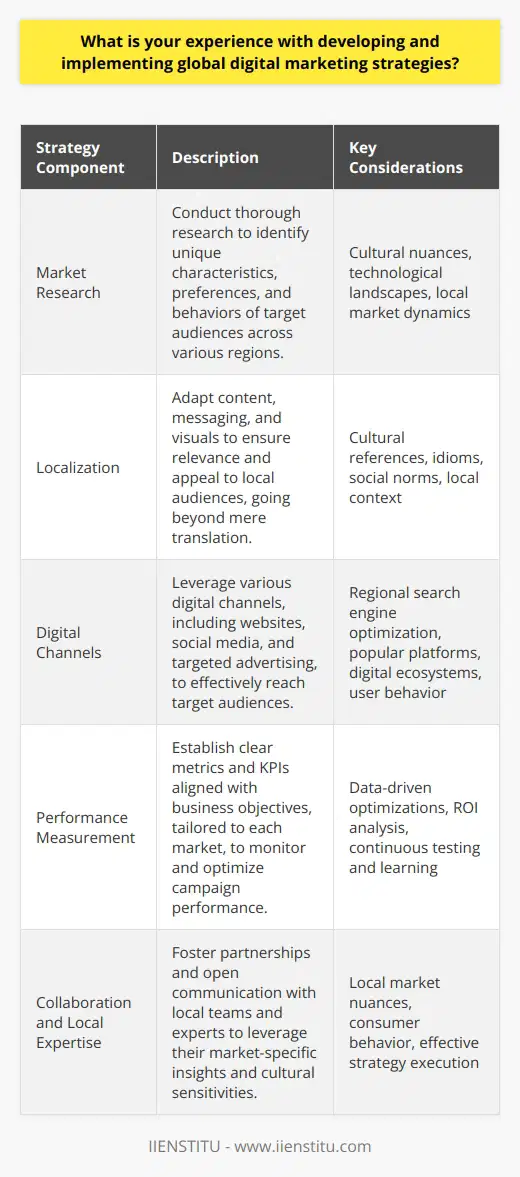
How do you ensure that your digital marketing efforts are effective across different cultures and regions?
Ensuring the effectiveness of digital marketing efforts across different cultures and regions requires a strategic approach. Marketers must conduct thorough research to understand the cultural nuances, preferences, and behaviors of their target audiences. This research should encompass factors such as language, values, traditions, and digital platform usage in each region. By gaining deep insights into these cultural aspects, marketers can tailor their messaging, visuals, and content to resonate with specific audiences.
Localization and Adaptation
Localization goes beyond mere translation; it involves adapting the entire marketing campaign to fit the cultural context. This includes adjusting the tone, imagery, and references to align with local preferences. Marketers should collaborate with local experts or partners who have a deep understanding of the culture. They can provide valuable insights and help create culturally relevant content that strikes a chord with the target audience. Localization ensures that the marketing messages are not only understood but also appreciated by the local audience.
Cultural Sensitivity
Cultural sensitivity is paramount when executing digital marketing campaigns across different regions. Marketers must be mindful of cultural taboos, social norms, and religious beliefs. They should avoid using language, symbols, or themes that might be offensive or inappropriate in certain cultures. It is essential to review and test marketing materials with local representatives to ensure they are culturally appropriate. By demonstrating cultural sensitivity, brands can build trust and respect among their target audiences.
Adapting to Local Platforms and Channels
Digital platform usage varies significantly across different countries and regions. Marketers must research the most popular and effective channels in each market. For example, while Facebook might be the dominant social media platform in one country, WeChat could be more prevalent in another. Marketers should adapt their strategies to leverage the platforms that their target audiences actively use. This may involve creating platform-specific content, utilizing local influencers, or participating in regional online communities.
Measuring and Optimizing Performance
To ensure the effectiveness of digital marketing efforts, it is crucial to establish relevant metrics and track performance across different regions. Marketers should define key performance indicators (KPIs) that align with their campaign goals and cultural contexts. They should monitor engagement rates, conversion rates, and other relevant metrics specific to each market. By regularly analyzing data and gathering feedback, marketers can identify areas for improvement and optimize their strategies accordingly.
Continuous Learning and Adaptation
Cultural trends and digital landscapes are constantly evolving, and what works in one region may not be effective in another. Marketers must embrace a continuous learning approach, staying updated on cultural shifts, emerging platforms, and changing consumer behaviors. They should be open to adapting their strategies based on new insights and feedback from local audiences. Regular communication with regional teams and partners can help marketers stay attuned to cultural nuances and make necessary adjustments to their campaigns.
Conclusion
Ensuring the effectiveness of digital marketing efforts across different cultures and regions requires a combination of research, localization, cultural sensitivity, platform adaptation, performance measurement, and continuous learning. By investing time and resources into understanding and respecting cultural differences, marketers can create campaigns that resonate with their target audiences and drive meaningful engagement. Through a strategic and culturally aware approach, brands can successfully navigate the complexities of global digital marketing and achieve their desired outcomes.
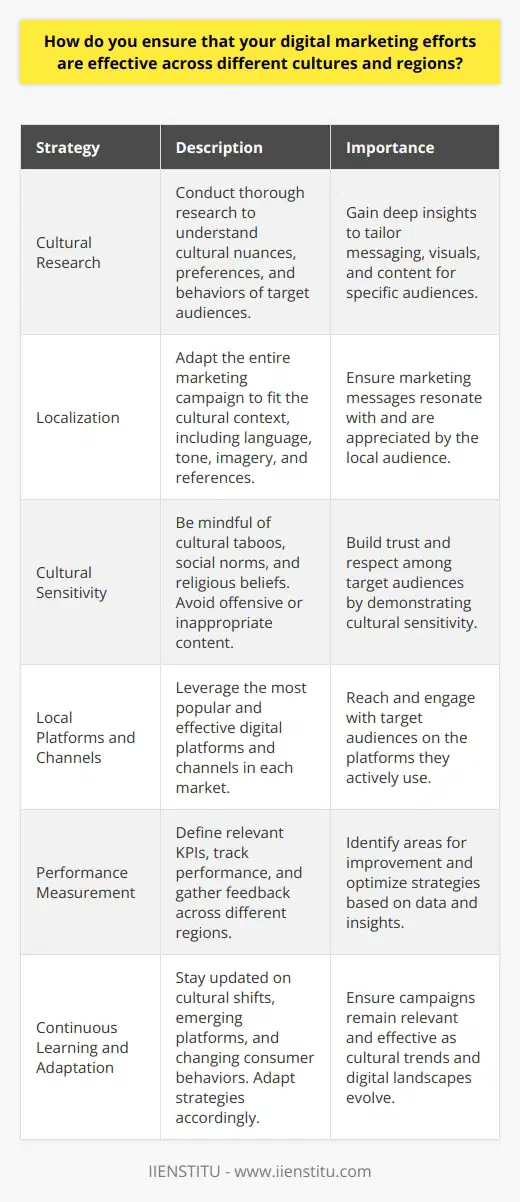
In what ways have you leveraged data and analytics to optimize global digital marketing campaigns?
Data and analytics play a crucial role in optimizing global digital marketing campaigns. By leveraging these tools, marketers can gain valuable insights into consumer behavior, preferences, and trends. This information allows them to make data-driven decisions that improve the effectiveness of their campaigns and maximize their return on investment (ROI).
Gathering and Analyzing Data
The first step in leveraging data and analytics for global digital marketing campaigns is to gather relevant data. This can include website traffic, social media engagement, email open rates, and conversion rates. By collecting this data, marketers can identify patterns and trends that provide valuable insights into consumer behavior.
Once the data has been collected, it must be analyzed to extract meaningful insights. This involves using various analytical tools and techniques, such as data visualization, statistical analysis, and machine learning algorithms. By analyzing the data, marketers can identify key performance indicators (KPIs) that measure the success of their campaigns and identify areas for improvement.
Segmenting and Targeting Audiences
One of the most effective ways to optimize global digital marketing campaigns is to segment and target audiences. By using data and analytics, marketers can identify specific groups of consumers who are most likely to engage with their brand and convert into customers. This allows them to create targeted campaigns that are tailored to the specific needs and preferences of each audience segment.
Demographic Segmentation
Demographic segmentation involves dividing audiences based on characteristics such as age, gender, income, and location. By analyzing demographic data, marketers can create campaigns that resonate with specific groups of consumers and increase the likelihood of conversion.
Behavioral Segmentation
Behavioral segmentation involves dividing audiences based on their actions and behaviors, such as website browsing history, purchase history, and social media engagement. By analyzing behavioral data, marketers can identify patterns and trends that provide insights into consumer preferences and interests. This allows them to create campaigns that are more relevant and engaging to their target audience.
Optimizing Campaign Performance
Once a global digital marketing campaign has been launched, it is important to continuously monitor and optimize its performance. By using data and analytics, marketers can track key metrics such as click-through rates, conversion rates, and ROI. This allows them to identify areas for improvement and make data-driven decisions that optimize campaign performance.
A/B Testing
A/B testing involves creating two versions of a campaign and comparing their performance to determine which one is more effective. By using data and analytics to track the performance of each version, marketers can identify the elements that are driving engagement and conversion and optimize their campaigns accordingly.
Personalization
Personalization involves tailoring campaigns to the specific needs and preferences of individual consumers. By using data and analytics to gather insights into consumer behavior and preferences, marketers can create highly personalized campaigns that are more likely to resonate with their target audience and drive engagement and conversion.
In conclusion, leveraging data and analytics is essential for optimizing global digital marketing campaigns. By gathering and analyzing data, segmenting and targeting audiences, and continuously monitoring and optimizing campaign performance, marketers can create campaigns that are more effective, efficient, and profitable.
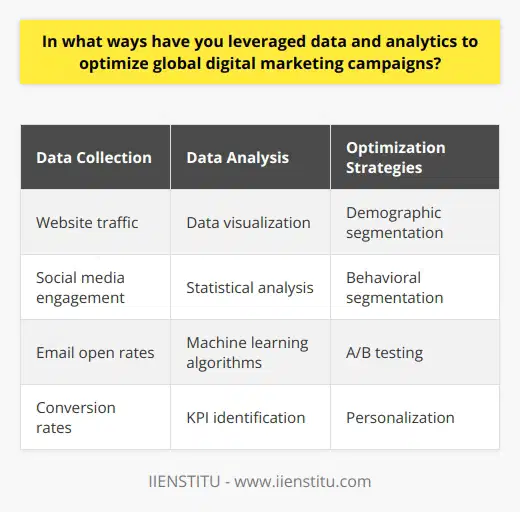
What are some common digital marketing interview questions and their appropriate answers?
Digital marketing interviews often focus on assessing a candidate's knowledge, experience, and problem-solving skills in the field. Interviewers typically ask questions related to various aspects of digital marketing, such as search engine optimization (SEO), pay-per-click (PPC) advertising, social media marketing, content marketing, and analytics. To successfully navigate these interviews, candidates should prepare well-thought-out, concise answers that demonstrate their expertise and ability to apply their knowledge in real-world scenarios.
SEO Questions
SEO is a crucial component of digital marketing, and interviewers often ask candidates to explain its importance. A strong answer would highlight how SEO helps improve a website's visibility in search engine results pages (SERPs), leading to increased organic traffic and potential conversions. Candidates should also be prepared to discuss various SEO strategies, such as keyword research, on-page optimization, and link building.
Example Question:
"How would you optimize a website for search engines?"
Appropriate Answer:
"To optimize a website for search engines, I would start by conducting thorough keyword research. This helps identify relevant, high-traffic keywords to target in the website's content. Next, I would focus on on-page optimization, ensuring that the targeted keywords are strategically placed in the page titles, headings, meta descriptions, and content. Additionally, I would work on improving the website's structure, navigation, and loading speed, as these factors influence SEO. Finally, I would implement a link-building strategy to acquire high-quality, relevant backlinks from reputable websites, which can boost the site's authority and search engine rankings."
PPC Advertising Questions
PPC advertising is another essential aspect of digital marketing, and interviewers may ask candidates to describe their experience with platforms like Google Ads or Microsoft Advertising. Candidates should be able to explain how they create and manage PPC campaigns, optimize ad copy and landing pages, and analyze campaign performance using metrics such as click-through rate (CTR) and conversion rate.
Example Question:
"How do you optimize a PPC campaign for better performance?"
Appropriate Answer:
"To optimize a PPC campaign, I start by reviewing the campaign's goals and target audience. I then analyze the campaign's performance data, looking at metrics like CTR, conversion rate, and cost per conversion. Based on this analysis, I identify areas for improvement, such as refining keyword targeting, adjusting bid strategies, or optimizing ad copy and landing pages. I also use A/B testing to experiment with different ad variations and landing page designs to determine which elements resonate best with the target audience. Continuously monitoring and iterating on the campaign helps ensure optimal performance and ROI."
Analytics Questions
Digital marketing professionals must be well-versed in analytics to measure the success of their campaigns and make data-driven decisions. Interviewers may ask candidates to explain how they use tools like Google Analytics to track website performance, analyze user behavior, and generate insights.
Example Question:
"How would you use Google Analytics to identify opportunities for improving a website's conversion rate?"
Appropriate Answer:
"To identify opportunities for improving a website's conversion rate using Google Analytics, I would first set up conversion tracking for key goals, such as form submissions or product purchases. Then, I would analyze the conversion funnel, looking at metrics like bounce rate, exit rate, and time on page for each step in the funnel. This helps identify potential barriers to conversion, such as confusing navigation or slow-loading pages. I would also use features like user flow and behavior reports to understand how users interact with the site and where they may be dropping off. Based on these insights, I would develop and implement strategies to optimize the user experience and improve conversion rates, such as simplifying the checkout process or creating more compelling calls-to-action."

How can I prepare for a digital marketing interview and provide compelling responses to questions?
To prepare for a digital marketing interview and provide compelling responses, you should focus on several key areas. First, research the company and its products or services to demonstrate your knowledge and interest. Review the job description carefully to identify the required skills and qualifications. Prepare examples from your previous experience that showcase your relevant abilities and achievements.
Next, familiarize yourself with common digital marketing concepts, strategies, and tools. These may include SEO, SEM, social media marketing, content marketing, email marketing, and analytics. Be ready to discuss how you have applied these techniques in your past roles and the results you achieved. Consider creating a portfolio of your best work to share with the interviewer.
Anticipate potential interview questions
Anticipate potential interview questions and practice your responses. Some common questions may include:
How do you stay up-to-date with the latest digital marketing trends?
What strategies would you use to improve our company's online presence?
How do you measure the success of a digital marketing campaign?
Describe a challenging project you worked on and how you overcame any obstacles.
When answering questions, use the STAR method (Situation, Task, Action, Result) to provide structured, concise responses. Share specific examples that highlight your problem-solving skills, creativity, and ability to work collaboratively.
Develop a strong understanding of the company's target audience
Develop a strong understanding of the company's target audience and be prepared to discuss how you would engage them. Research their preferences, behaviors, and pain points to create targeted marketing strategies. Show enthusiasm for the company's mission and explain how your skills and experience align with their goals.
Prepare thoughtful questions for the interviewer
Prepare thoughtful questions for the interviewer to demonstrate your interest and critical thinking skills. Ask about the company's marketing challenges, plans for growth, and opportunities for professional development. Inquire about the team structure and company culture to assess if the role is a good fit for you.
Practice active listening and maintain a confident demeanor
During the interview, practice active listening and maintain a confident demeanor. Make eye contact, smile, and show genuine interest in the conversation. If faced with a question you're unsure about, take a moment to collect your thoughts before responding. Remember, the interview is an opportunity to showcase your skills and enthusiasm for the role.
By following these steps and dedicating time to preparation, you can increase your chances of success in a digital marketing interview. Research, practice, and confidence are key to providing compelling responses and making a strong impression on the interviewer.
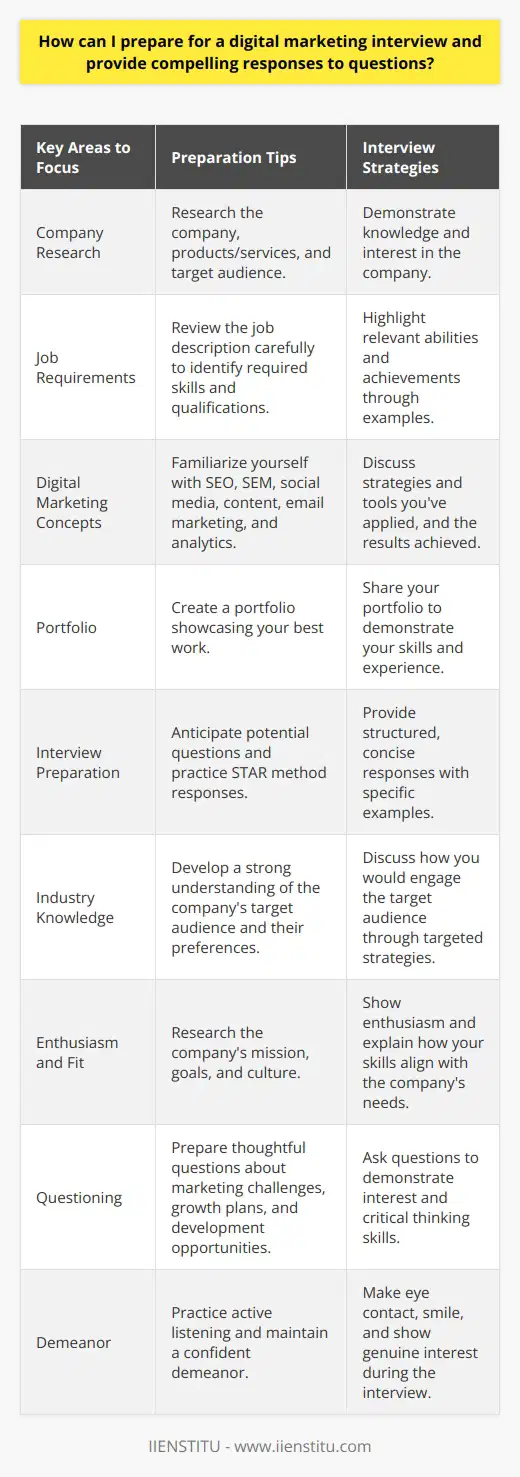
What are the most important digital marketing concepts to understand and articulate during an interview?
Understanding key digital marketing concepts is crucial when preparing for an interview in this field. Familiarizing yourself with essential terms and strategies will help you articulate your knowledge and stand out as a qualified candidate. Let's explore the most important digital marketing concepts to grasp before your interview.
Search Engine Optimization (SEO)
SEO is the practice of optimizing a website to rank higher in search engine results pages (SERPs). It involves keyword research, on-page optimization, and link building. Understanding how search engines work and the best practices for improving a website's visibility is essential.
Keyword Research
Keyword research involves identifying the terms and phrases that potential customers use when searching for products or services. By targeting the right keywords, you can attract relevant traffic to a website and improve its ranking in SERPs.
On-Page Optimization
On-page optimization focuses on improving the content and structure of a website to make it more search engine-friendly. This includes optimizing titles, meta descriptions, headers, and images, as well as ensuring that the website has a clear hierarchy and easy navigation.
Link Building
Link building is the process of acquiring high-quality backlinks from other websites to improve a website's authority and ranking. It's important to understand the difference between natural and artificial links and the best practices for building a strong backlink profile.
Pay-Per-Click (PPC) Advertising
PPC advertising is a model where advertisers pay each time a user clicks on one of their ads. The most common PPC platform is Google Ads, which allows businesses to display ads in search results and on other websites in the Google Display Network.
Ad Auction
The ad auction is the process that determines which ads are shown and in what order. Advertisers bid on keywords, and the ads with the highest Quality Score and bid are displayed first.
Quality Score
Quality Score is a metric that measures the relevance and quality of an ad and its landing page. A higher Quality Score can lead to lower costs and better ad positions.
Social Media Marketing
Social media marketing involves promoting a brand and engaging with customers on social media platforms like Facebook, Instagram, and Twitter. It's important to understand the unique features and best practices for each platform.
Content Creation
Creating engaging and shareable content is key to success on social media. This can include images, videos, infographics, and blog posts that provide value to the target audience.
Community Management
Community management involves monitoring and responding to comments and messages on social media, as well as fostering relationships with followers and influencers. It's important to have a clear strategy for handling negative feedback and maintaining a positive brand image.
Email Marketing
Email marketing involves sending targeted messages to a list of subscribers to promote products, services, or content. It's a cost-effective way to nurture leads and retain customers.
Segmentation
Segmentation is the practice of dividing an email list into smaller groups based on specific criteria, such as demographics or behavior. This allows for more personalized and effective messaging.
Automation
Email automation involves setting up triggered emails that are sent automatically based on specific actions or schedules. This can include welcome emails, abandoned cart reminders, and birthday promotions.
By demonstrating a solid understanding of these digital marketing concepts during your interview, you'll showcase your expertise and potential value to the company. Remember to provide examples of how you've applied these concepts in previous roles or projects, and be prepared to discuss how you'd use them to achieve the company's goals.
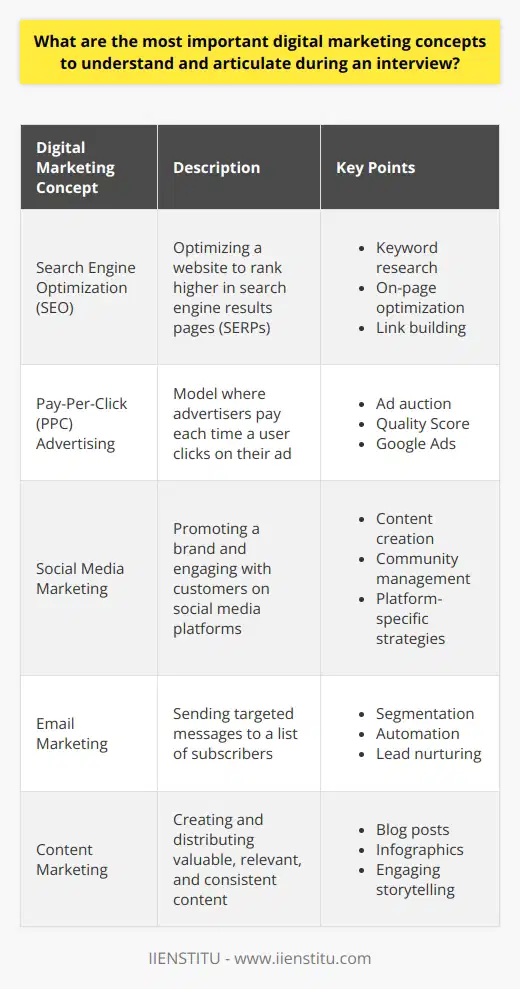
What are the most common digital marketing interview questions and their answers in PDF format?
Digital marketing interview questions often focus on a candidate's knowledge of various online marketing strategies and platforms. Some of the most common questions revolve around search engine optimization (SEO), pay-per-click (PPC) advertising, social media marketing, content marketing, and email marketing. Interviewers may also inquire about the candidate's experience with web analytics tools, such as Google Analytics, and their ability to interpret data to make informed marketing decisions.
SEO Questions
SEO questions typically assess a candidate's understanding of keyword research, on-page optimization, link building, and technical SEO factors. Candidates should be prepared to explain how they would conduct keyword research, optimize website content and meta tags, and build high-quality backlinks to improve a website's search engine rankings.
PPC Advertising Questions
PPC questions often focus on a candidate's experience with platforms like Google Ads and Facebook Ads. Interviewers may ask about the candidate's strategies for creating effective ad copy, targeting the right audience, managing budgets, and optimizing campaigns based on performance data.
Social Media Marketing Questions
Social media marketing questions assess a candidate's knowledge of various social media platforms and their ability to create engaging content. Candidates should be prepared to discuss their experience with platforms like Facebook, Instagram, Twitter, and LinkedIn, as well as their strategies for growing followers, increasing engagement, and measuring the success of social media campaigns.
Content Marketing Questions
Content marketing questions focus on a candidate's ability to create and distribute valuable, relevant content to attract and retain a target audience. Interviewers may ask about the candidate's experience with blogging, video production, podcasting, and other forms of content creation, as well as their strategies for promoting content and measuring its effectiveness.
Email Marketing Questions
Email marketing questions assess a candidate's knowledge of email campaign management, list segmentation, and email design best practices. Candidates should be prepared to discuss their experience with email marketing platforms, such as Mailchimp or Constant Contact, and their strategies for creating compelling email content, improving open and click-through rates, and growing email lists.
Web Analytics Questions
Web analytics questions focus on a candidate's ability to use tools like Google Analytics to track website traffic, user behavior, and conversions. Interviewers may ask about the candidate's experience with setting up tracking codes, creating custom reports, and using data to inform marketing decisions and optimize campaigns.
To best prepare for a digital marketing interview, candidates should review common questions and practice articulating their experiences and strategies. Having a solid understanding of various digital marketing concepts, platforms, and best practices, as well as the ability to provide concrete examples of successful campaigns, will help candidates stand out during the interview process.

Where can I find a comprehensive PDF guide on digital marketing interview questions and answers?
Finding a comprehensive PDF guide on digital marketing interview questions and answers can be challenging. However, there are several reliable sources available online that can help you prepare for your upcoming interview. One such resource is the "Digital Marketing Interview Questions and Answers" guide by SimpliLearn, which covers a wide range of topics related to digital marketing, including SEO, PPC, social media marketing, content marketing, and more.
Online Resources for Digital Marketing Interview Preparation
In addition to SimpliLearn, there are many other websites that offer valuable resources for digital marketing interview preparation. These include:
HubSpot's "The Ultimate Guide to Preparing for a Digital Marketing Interview"
Skillcrush's "Digital Marketing Interview Questions and Answers"
DigitalMarketer's "The Ultimate Guide to Digital Marketing Interview Questions"
These guides provide in-depth coverage of the most common interview questions asked in digital marketing interviews. They also offer tips and strategies for answering these questions effectively and showcasing your knowledge and experience in the field.
Benefits of Using a Comprehensive PDF Guide
Using a comprehensive PDF guide to prepare for your digital marketing interview has several benefits. First, it allows you to study at your own pace and in your own time, without the need for expensive courses or coaching. Second, it provides a structured approach to interview preparation, ensuring that you cover all the essential topics and concepts. Finally, it gives you the confidence and knowledge you need to ace your interview and land your dream job in digital marketing.
Tips for Using a PDF Guide Effectively
To get the most out of your PDF guide, follow these tips:
Read through the guide thoroughly and take notes on key concepts and ideas
Practice answering the interview questions out loud, either alone or with a friend or family member
Research the company and position you are interviewing for, and tailor your answers accordingly
Focus on highlighting your strengths and achievements in digital marketing, using specific examples and data to support your points
Conclusion
In conclusion, finding a comprehensive PDF guide on digital marketing interview questions and answers is an excellent way to prepare for your upcoming interview. By using a reliable source such as SimpliLearn or one of the other guides mentioned above, you can gain the knowledge and confidence you need to succeed in your interview and take the next step in your digital marketing career.

Can you recommend a reliable source for downloading a PDF with digital marketing interview questions and answers?
Recommending a reliable source for downloading a digital marketing interview questions and answers PDF requires careful consideration. It is essential to ensure the source is reputable, up-to-date, and provides accurate information. One approach is to search for well-known digital marketing websites, blogs, or forums that offer such resources. These platforms often have a dedicated community of professionals who share their knowledge and experiences.
Reputable Digital Marketing Websites
Websites like HubSpot, Moz, and Digital Marketing Institute are renowned for their expertise in digital marketing. They frequently publish articles, guides, and resources on various aspects of digital marketing, including interview preparation. Exploring their content libraries may lead to finding a suitable PDF with interview questions and answers.
Industry-Specific Forums and Communities
Engaging with digital marketing forums and online communities can be beneficial in finding reliable resources. Platforms like Reddit, Quora, and LinkedIn have active digital marketing communities where professionals share their insights and experiences. Posting a question or searching for existing threads related to digital marketing interview questions can yield helpful recommendations from experienced individuals.
Educational Platforms and Online Courses
Educational platforms like Coursera, Udemy, and edX offer digital marketing courses taught by industry experts. These courses often include interview preparation materials, such as PDFs with commonly asked questions and suggested answers. Enrolling in a reputable digital marketing course can provide access to reliable interview resources while also enhancing overall knowledge of the subject.
Consulting with Digital Marketing Professionals
Reaching out to digital marketing professionals in your network can be a valuable approach. They may have firsthand experience with interviews and can recommend reliable sources for interview preparation materials. Connecting with professionals on LinkedIn or attending digital marketing events can facilitate such conversations and lead to valuable recommendations.
Verifying the Credibility of Sources
When considering a source for downloading a digital marketing interview questions PDF, it is crucial to verify its credibility. Look for sources that have a track record of providing accurate and up-to-date information. Check the author's credentials and expertise in the field. Reading reviews and feedback from other users can also provide insights into the reliability of the source.
Keeping the Information Up to Date
Digital marketing is a dynamic field, and interview questions can evolve over time. It is important to ensure that the PDF you download contains current and relevant information. Look for sources that regularly update their content to reflect the latest trends and best practices in digital marketing. Outdated information may not align with the current expectations of interviewers.
In summary, finding a reliable source for downloading a digital marketing interview questions and answers PDF involves exploring reputable websites, engaging with industry communities, considering educational platforms, and consulting with professionals. Verifying the credibility of the source and ensuring the information is up to date are essential steps in selecting a suitable resource. By following these guidelines, you can increase your chances of finding a reliable PDF that effectively prepares you for a digital marketing interview.
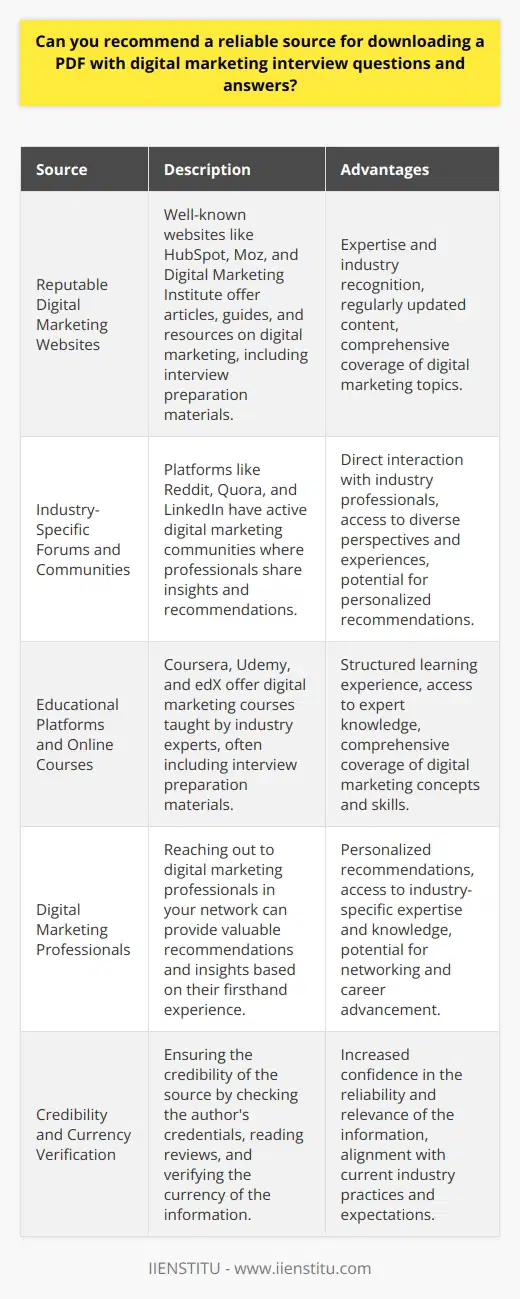
What are your greatest strengths and weaknesses, and how do they relate to your professional experience?
My greatest strengths lie in my ability to analyze complex problems and develop innovative solutions. I possess strong critical thinking skills, which enable me to break down intricate issues and identify the root causes. This analytical prowess has proven invaluable in my professional experience, particularly when tackling challenging projects that require a keen eye for detail and a systematic approach to problem-solving.
Another significant strength of mine is my exceptional communication skills. I have a natural ability to articulate ideas clearly and effectively, both in written and verbal form. This has allowed me to collaborate seamlessly with colleagues, clients, and stakeholders, ensuring that everyone is on the same page and working towards common goals. My communication skills have also been instrumental in presenting complex information in a way that is easily understandable to diverse audiences.
Adaptability and Resilience
Adaptability and resilience are two other strengths that have served me well in my professional journey. I thrive in dynamic environments where change is constant, and I am able to quickly adjust my approach to meet evolving needs. This flexibility has enabled me to navigate through uncertain times and overcome obstacles with a positive attitude. I view challenges as opportunities for growth and learning, and I am not afraid to step out of my comfort zone to tackle new tasks or explore innovative ideas.
Time Management and Organization
Effective time management and organization are also among my key strengths. I am skilled at prioritizing tasks, setting realistic deadlines, and managing multiple projects simultaneously. This has allowed me to consistently deliver high-quality work within tight timeframes, even under pressure. I am also meticulous in my approach to organization, ensuring that all relevant information and resources are easily accessible and well-structured. This attention to detail has helped me maintain efficiency and productivity in fast-paced work environments.
Weaknesses and Areas for Improvement
While I take pride in my strengths, I am also aware of my weaknesses and areas for improvement. One weakness I have identified is my tendency to be overly self-critical at times. I set high standards for myself and can be my own harshest critic, which can sometimes lead to unnecessary stress and self-doubt. I am actively working on developing a more balanced perspective and learning to celebrate my achievements while still striving for continuous improvement.
Delegating Tasks and Seeking Help
Another area where I see room for growth is in delegating tasks and seeking help when needed. As someone who values independence and self-sufficiency, I have sometimes struggled with delegating responsibilities to others. However, I have come to realize that effective collaboration and the ability to leverage the strengths of team members are essential for success in any professional setting. I am making a conscious effort to trust in the capabilities of my colleagues and to ask for assistance when necessary, recognizing that it is a sign of strength rather than weakness.
Continuous Learning and Development
Despite my weaknesses, I am committed to continuous learning and development. I actively seek out opportunities to expand my knowledge and skills, whether through formal training, mentorship, or hands-on experience. I believe that embracing a growth mindset is crucial for long-term success and personal fulfillment. By consistently pushing myself out of my comfort zone and taking on new challenges, I aim to transform my weaknesses into strengths and become a more well-rounded professional.
In conclusion, my greatest strengths – analytical thinking, communication skills, adaptability, and time management – have been instrumental in my professional success. However, I also acknowledge my weaknesses, such as being overly self-critical and struggling with delegation. By focusing on continuous learning and development, I am committed to leveraging my strengths while addressing my weaknesses, ultimately striving to become the best version of myself in both personal and professional spheres.
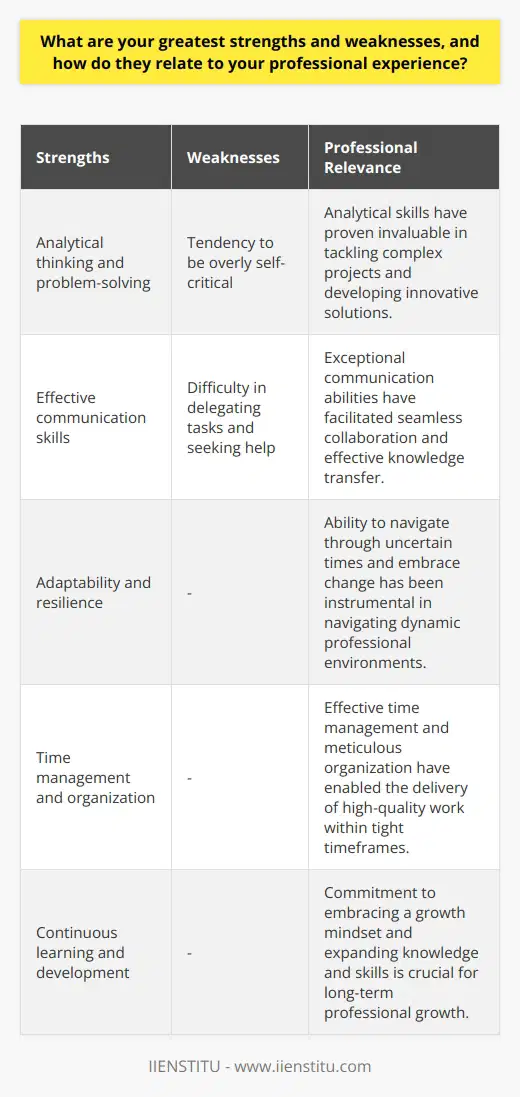
How do you stay current with the latest trends and best practices in digital marketing?
Staying current with the latest trends and best practices in digital marketing is essential for professionals in the field. One effective way to stay informed is by regularly reading industry blogs and publications. These resources often feature articles written by experts who share their insights and experiences. Attending conferences and webinars is another excellent method for staying up-to-date. These events provide opportunities to learn from thought leaders and network with peers.
Engage with the Digital Marketing Community
Engaging with the digital marketing community is a great way to stay current. Joining online forums and social media groups allows you to connect with other professionals. These platforms facilitate discussions about the latest trends, challenges, and successes in the industry. Participating in these conversations can help you gain valuable insights and fresh perspectives.
Experiment with New Strategies and Tools
Experimenting with new strategies and tools is crucial for staying ahead of the curve. As digital marketing evolves, it's essential to test and adapt to new approaches. This may involve trying out emerging social media platforms or exploring innovative ad formats. By actively experimenting, you can gain firsthand experience and determine what works best for your audience.
Analyze Data and Monitor Metrics
Analyzing data and monitoring metrics are key components of staying current in digital marketing. Regularly reviewing analytics enables you to identify trends and patterns in user behavior. This information can help you make data-driven decisions and optimize your strategies. Tools like Google Analytics provide valuable insights into website traffic, user engagement, and conversion rates.
Collaborate with Industry Peers
Collaborating with industry peers is another effective way to stay current. Reach out to colleagues and build relationships with other digital marketing professionals. Share knowledge, discuss challenges, and brainstorm ideas together. Collaborating fosters a sense of community and enables you to learn from others' experiences and expertise.
Invest in Continuous Learning
Investing in continuous learning is essential for staying current in digital marketing. The industry is constantly evolving, and new technologies and strategies emerge regularly. Dedicating time to professional development ensures that you remain knowledgeable and competitive. Consider enrolling in online courses, attending workshops, or pursuing certifications to expand your skill set.
By actively engaging with the digital marketing community, experimenting with new strategies, analyzing data, collaborating with peers, and investing in continuous learning, professionals can effectively stay current with the latest trends and best practices in the field.
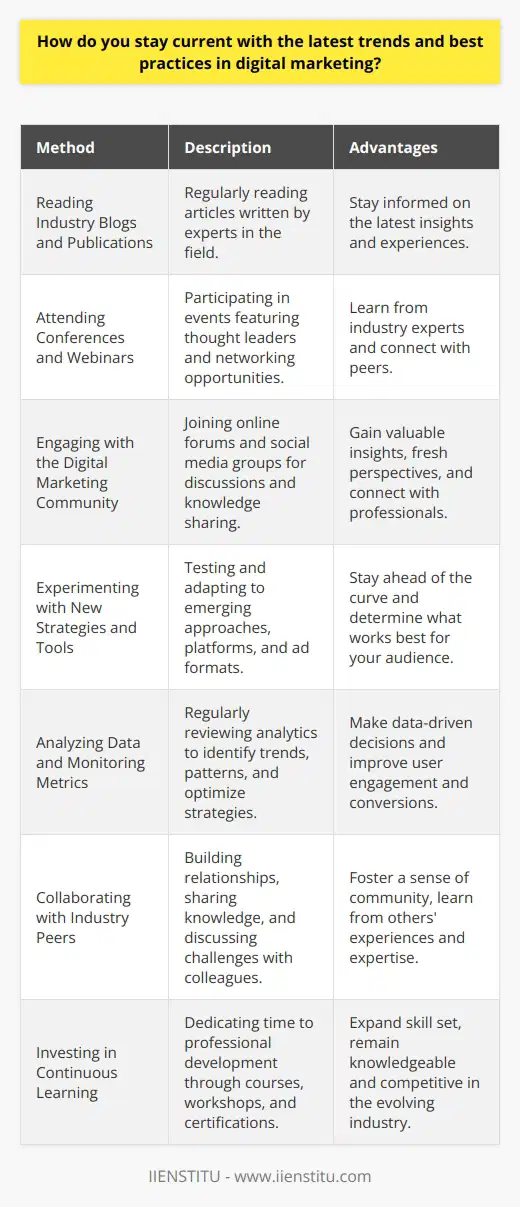
Can you describe a successful digital marketing campaign you have worked on, and what made it effective?
One successful digital marketing campaign I worked on was for a local e-commerce business selling handmade crafts. The campaign's effectiveness stemmed from a combination of targeted advertising, engaging content, and a well-designed landing page. By focusing on a specific target audience and creating ads that resonated with their interests, we were able to drive high-quality traffic to the website.
Engaging Content and Social Media Presence
To keep potential customers interested, we created a series of blog posts and social media content. These posts showcased the unique stories behind the handmade products and the artisans who made them. By highlighting the human element and the craftsmanship involved, we were able to create an emotional connection with the audience. This led to increased engagement and shares on social media platforms, further expanding the reach of the campaign.
Optimized Landing Page and User Experience
The landing page was optimized for conversions, with a clean design and clear calls-to-action. We made sure that the page loaded quickly and was mobile-friendly, as a significant portion of the traffic came from mobile devices. The user experience was seamless, with easy navigation and a simple checkout process. This helped to reduce bounce rates and increase the likelihood of visitors making a purchase.
Data-Driven Approach and Continuous Optimization
Throughout the campaign, we closely monitored key performance indicators such as click-through rates, conversion rates, and revenue generated. By analyzing this data, we were able to identify areas for improvement and make data-driven decisions to optimize the campaign. This included adjusting ad targeting, refining ad copy and visuals, and making tweaks to the landing page to improve performance.
Personalization and Email Marketing
To further engage with customers and encourage repeat purchases, we implemented a personalized email marketing strategy. This included sending targeted product recommendations based on previous purchases and browsing behavior. We also sent out exclusive offers and discounts to loyal customers, which helped to increase customer retention and lifetime value.
Influencer Partnerships and User-Generated Content
To expand the reach of the campaign and build trust with potential customers, we partnered with relevant influencers in the handmade crafts niche. These influencers created authentic content showcasing the products and shared their experiences with their followers. This helped to drive additional traffic and sales, as well as generate user-generated content. We encouraged customers to share their own photos and reviews of the products, which we then featured on the website and social media channels.
The success of this digital marketing campaign was due to a holistic approach that combined various strategies and tactics. By focusing on the target audience, creating engaging content, optimizing the user experience, and continuously analyzing and refining the campaign, we were able to achieve significant growth in website traffic, conversions, and revenue for the e-commerce business.
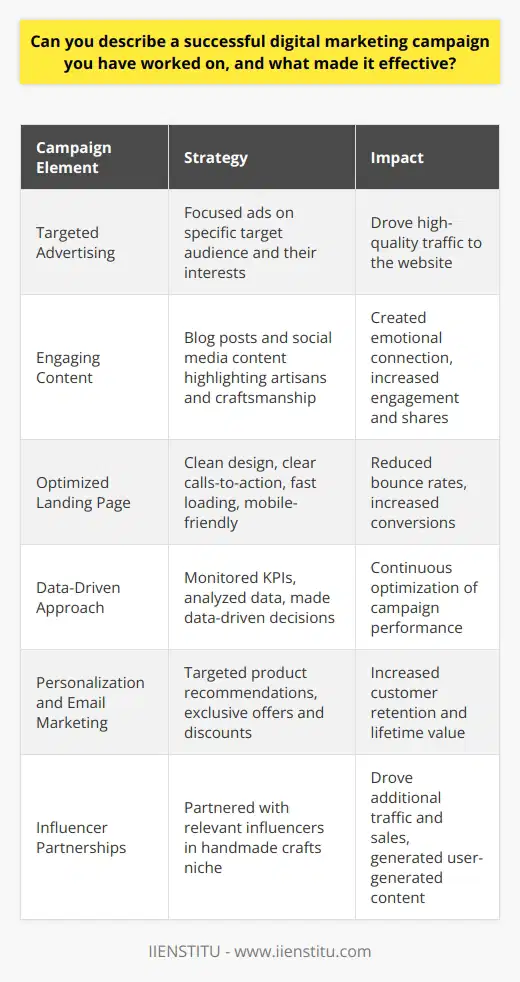
What is your experience with global digital marketing campaigns?
Global digital marketing campaigns have become increasingly prevalent in today's interconnected world. These campaigns leverage various online platforms and strategies to reach target audiences across different countries and cultures. In my experience, executing a successful global digital marketing campaign requires careful planning, research, and adaptation.
Understanding Target Markets
One of the key aspects of global digital marketing is understanding the unique characteristics and preferences of each target market. This involves conducting thorough research on cultural norms, consumer behavior, and local market trends. By gaining insights into the specific needs and expectations of different regions, marketers can tailor their messaging and strategies accordingly.
Localization and Adaptation
Effective global digital marketing campaigns often require localization and adaptation. This means adjusting content, visuals, and overall approach to resonate with the local audience. Translating content into the native language, using culturally relevant imagery, and considering local customs and traditions are essential steps in creating a campaign that feels authentic and engaging to the target market.
Choosing the Right Channels
Selecting the appropriate digital channels is crucial for the success of a global campaign. Different regions may have varying preferences for social media platforms, search engines, or e-commerce sites. For example, while Facebook and Instagram are widely used in many countries, platforms like WeChat and Weibo are more popular in China. Understanding the digital landscape of each market helps in allocating resources and optimizing campaign performance.
Collaboration with Local Partners
Collaborating with local partners, such as influencers, agencies, or media outlets, can greatly enhance the effectiveness of a global digital marketing campaign. These partners bring valuable insights, networks, and credibility within their respective markets. By leveraging their expertise and reach, marketers can better navigate cultural nuances, build trust with the local audience, and amplify the campaign's impact.
Measuring and Optimizing Performance
Measuring the performance of a global digital marketing campaign is essential for continuous improvement and optimization. Key performance indicators (KPIs) should be defined based on the campaign's objectives, such as brand awareness, engagement, or conversions. Regularly monitoring and analyzing data across different markets helps identify areas of success and opportunities for refinement. Adapting strategies based on performance insights ensures that the campaign remains relevant and effective over time.
Embracing Flexibility and Agility
Global digital marketing campaigns often require a high degree of flexibility and agility. Market conditions, consumer preferences, and technological landscapes can change rapidly, especially in the digital realm. Being prepared to adapt strategies, adjust messaging, or pivot tactics is crucial for staying ahead of the curve and maintaining a competitive edge. Embracing a flexible mindset allows marketers to respond swiftly to new opportunities or challenges that arise.
In conclusion, my experience with global digital marketing campaigns has taught me the importance of understanding target markets, adapting to local cultures, selecting the right channels, collaborating with local partners, measuring performance, and embracing flexibility. By applying these principles and continuously learning from each campaign, marketers can effectively navigate the complexities of the global digital landscape and achieve their desired outcomes.
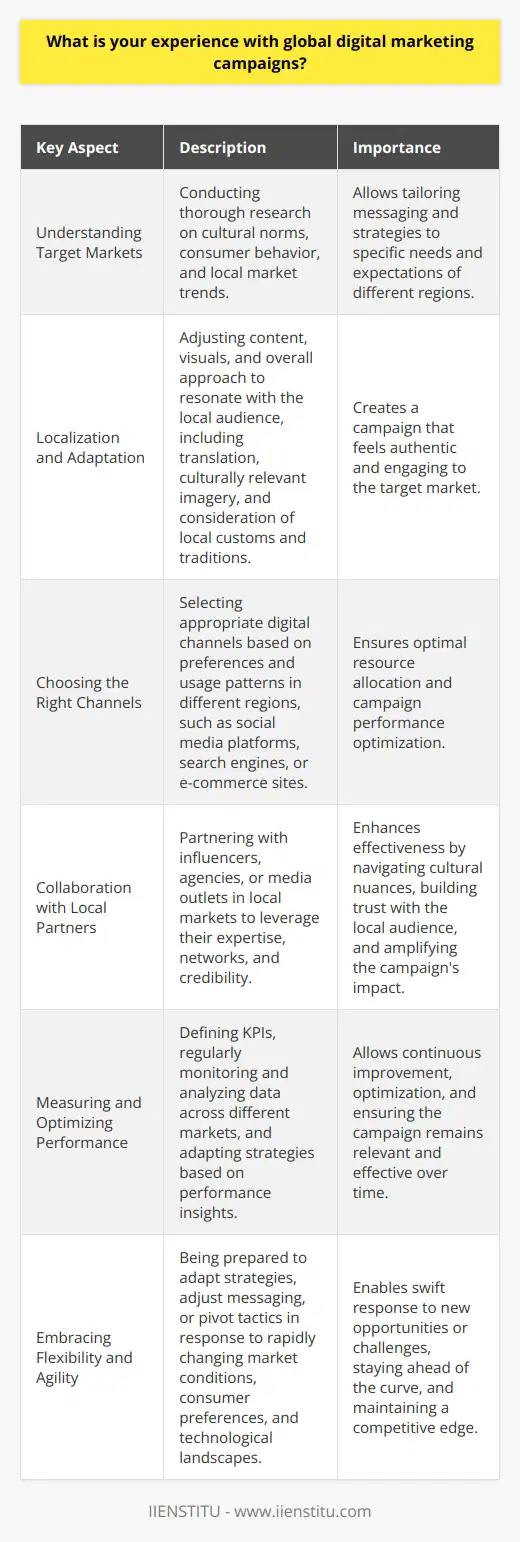
How do you stay up-to-date with the latest trends and best practices in global digital marketing?
Staying up-to-date with the latest trends and best practices in global digital marketing is crucial for success. One effective way to achieve this is by regularly reading industry blogs and publications. These resources provide valuable insights into emerging trends, case studies, and expert opinions. Attending digital marketing conferences and webinars is another excellent method to stay informed. These events offer opportunities to learn from thought leaders, network with peers, and discover new tools and strategies. Engaging with digital marketing communities on social media platforms like LinkedIn and Twitter can also be beneficial. These communities facilitate knowledge sharing, discussions, and collaborations among professionals in the field. Additionally, experimenting with new digital marketing techniques and technologies can help you stay ahead of the curve. By testing and analyzing the results of these experiments, you can identify what works best for your brand and audience. Continuously monitoring and analyzing your digital marketing metrics is also essential for staying up-to-date. This data-driven approach allows you to identify areas for improvement and adapt your strategies accordingly.
Read Industry Blogs and Publications
Industry blogs and publications are valuable resources for staying informed about the latest digital marketing trends. They offer a wealth of information, including case studies, expert opinions, and practical tips. Make a habit of regularly reading reputable sources to expand your knowledge and stay current.
Attend Digital Marketing Conferences and Webinars
Conferences and webinars provide excellent opportunities to learn from industry experts and thought leaders. These events cover a wide range of topics, from emerging technologies to best practices. Attending them can help you gain new insights, network with peers, and discover innovative strategies.
Engage with Digital Marketing Communities
Digital marketing communities on social media platforms like LinkedIn and Twitter are hubs for knowledge sharing and collaboration. Engaging with these communities allows you to participate in discussions, ask questions, and learn from the experiences of others. Building relationships with fellow professionals can also lead to valuable partnerships and opportunities.
Experiment with New Techniques and Technologies
To stay ahead of the curve, it's essential to experiment with new digital marketing techniques and technologies. This hands-on approach allows you to gain practical experience and determine what works best for your brand and audience. Be open to trying new tools, platforms, and strategies, and analyze the results to refine your approach.
Monitor and Analyze Your Metrics
Data-driven decision-making is crucial for staying up-to-date with digital marketing best practices. Regularly monitoring and analyzing your metrics helps you identify areas for improvement and adapt your strategies accordingly. Use tools like Google Analytics to track key performance indicators, such as website traffic, conversion rates, and engagement levels. This data-driven approach ensures that your digital marketing efforts remain effective and aligned with the latest trends.

Can you provide an example of a successful global digital marketing initiative you have worked on?
One successful global digital marketing initiative I have worked on involved a multinational technology company's product launch. The objective was to create a cohesive and impactful digital campaign that resonated with audiences across different regions. We developed a strategy that encompassed various digital channels, including social media, email marketing, and targeted advertising.
Tailoring Content for Global Audiences
To ensure the campaign's success, we conducted extensive research on the target markets' cultural nuances and preferences. This insight allowed us to tailor our messaging and visuals to each region, making the content more relatable and engaging. We collaborated with local teams to translate and adapt the creative assets, maintaining brand consistency while respecting cultural differences.
Leveraging Influencer Partnerships
Influencer partnerships played a crucial role in amplifying the campaign's reach and credibility. We identified and collaborated with influential figures in each market, leveraging their unique styles and voices to showcase the product's benefits authentically. These partnerships helped us tap into new audience segments and generate valuable user-generated content.
Data-Driven Optimization
Throughout the campaign, we closely monitored performance metrics and utilized data analytics to optimize our strategies in real-time. By continuously analyzing audience engagement, click-through rates, and conversion data, we made data-driven decisions to refine our targeting, ad placements, and content formats. This agile approach allowed us to maximize the campaign's impact and ROI.
Engaging Interactive Experiences
To further captivate audiences, we created immersive and interactive digital experiences. We developed a gamified microsite that encouraged users to explore the product's features in a fun and engaging way. Additionally, we hosted live virtual events and webinars, providing opportunities for direct interaction with the brand and fostering a sense of community among global audiences.
Measuring Success and Insights
The campaign achieved remarkable results, surpassing key performance indicators across all markets. We observed significant increases in brand awareness, website traffic, and product sales. By leveraging advanced analytics tools, we gained valuable insights into audience behavior and preferences, which informed future marketing strategies and product development decisions.
Key Takeaways
The success of this global digital marketing initiative can be attributed to several key factors:
Thorough research and understanding of target markets
Tailored content and messaging for each region
Strategic influencer partnerships
Data-driven optimization and agility
Engaging interactive experiences
Comprehensive performance measurement and analysis
By leveraging these strategies and adopting a customer-centric approach, we successfully navigated the challenges of a global campaign and delivered impactful results for the client. This experience reinforced the importance of cultural sensitivity, data-driven decision-making, and continuous optimization in the realm of global digital marketing.

What experience do you have with global digital marketing?
Global digital marketing encompasses a wide range of strategies and tactics used to reach audiences worldwide. It involves leveraging digital channels and platforms to promote products, services, and brands to a global market. To effectively engage in global digital marketing, one must possess a diverse skill set and knowledge base.
Understanding Cultural Differences
A crucial aspect of global digital marketing is understanding and adapting to cultural differences across various regions. This includes being aware of local customs, values, and preferences that may influence consumer behavior. Conducting thorough research and analysis of target markets is essential to develop culturally relevant marketing messages and campaigns.
Multilingual Content Creation
Creating content in multiple languages is a fundamental requirement for global digital marketing. This involves translating and localizing website content, social media posts, advertisements, and other marketing materials to cater to different language audiences. Collaborating with native speakers or professional translation services ensures that the content is accurate, culturally appropriate, and resonates with the target audience.
SEO and SEM Strategies
Search engine optimization (SEO) and search engine marketing (SEM) are critical components of global digital marketing. Optimizing websites and content for different search engines and keywords relevant to each target market is essential. This may involve conducting keyword research in various languages, building localized backlinks, and adapting content to meet the specific search behaviors and preferences of different regions.
Social Media Marketing
Social media platforms have become powerful tools for global digital marketing. Understanding the popular social networks in each target market and tailoring content and strategies accordingly is crucial. This may involve creating localized social media profiles, engaging with local influencers, and running targeted advertising campaigns on platforms like Facebook, Instagram, or regional social networks specific to certain countries.
Data Analysis and Insights
Collecting and analyzing data is vital for measuring the effectiveness of global digital marketing efforts. Utilizing web analytics tools, such as Google Analytics, helps track website traffic, user behavior, and conversions from different regions. Social media analytics provide insights into engagement, reach, and sentiment across various platforms. Interpreting this data allows for data-driven decision-making and optimization of marketing strategies.
Continuous Learning and Adaptation
Global digital marketing is a constantly evolving field, with new trends, technologies, and platforms emerging regularly. Staying updated with the latest developments and best practices is essential for success. Continuous learning through attending industry conferences, participating in online courses, and engaging with global marketing communities helps expand knowledge and adapt to the changing landscape.
Collaboration and Partnerships
Building relationships and collaborating with local partners, agencies, or influencers can greatly enhance global digital marketing efforts. These partnerships provide valuable insights into local market dynamics, cultural nuances, and effective strategies. Collaborating with experts who have on-the-ground experience and networks in specific regions can accelerate growth and success in those markets.
In conclusion, global digital marketing requires a comprehensive understanding of cultural differences, multilingual content creation, SEO and SEM strategies, social media marketing, data analysis, continuous learning, and collaboration with local partners. By developing these skills and adapting to the unique challenges and opportunities of each market, businesses can effectively reach and engage global audiences through digital channels.

Can you describe a digital marketing campaign you have worked on that targeted an international audience?
One digital marketing campaign I worked on that targeted an international audience was for a global e-commerce company. The campaign aimed to increase brand awareness and drive sales in multiple countries simultaneously. We conducted extensive research on each target market to understand consumer preferences, cultural nuances, and online behaviors.
Tailoring Content for Each Market
Based on our findings, we developed a localized content strategy that resonated with each market. We created unique ad copy, images, and landing pages that spoke directly to the target audience in their native language. Our team collaborated with local influencers and content creators to produce authentic and engaging content.
Optimizing for Local Search Engines
To maximize visibility, we optimized the website and content for local search engines in each country. We conducted keyword research to identify high-volume, relevant search terms and incorporated them into the site's metadata and content. Additionally, we ensured that the website's structure and technical elements were in line with local search engine guidelines.
Leveraging Social Media Platforms
Social media played a crucial role in reaching and engaging with our international audience. We identified the most popular social media platforms in each country and tailored our content and ad formats accordingly. For example, in some markets, we focused on visual platforms like Instagram, while in others, we prioritized messaging apps like WhatsApp.
Running Targeted Ad Campaigns
We launched targeted ad campaigns on various social media platforms and search engines. Our ads were customized for each market, featuring local imagery, language, and promotions. We continually monitored and optimized the campaigns based on performance data, making adjustments to targeting, ad copy, and landing pages to improve conversion rates.
Measuring and Analyzing Results
Throughout the campaign, we closely tracked key performance indicators such as website traffic, engagement rates, and sales conversions. We used web analytics tools to analyze user behavior and identify areas for improvement. Regular reporting and analysis allowed us to make data-driven decisions and optimize the campaign for better results.
Adapting to Cultural Differences
One of the biggest challenges we faced was navigating cultural differences across markets. What worked well in one country didn't always translate to another. We had to be flexible and adapt our approach based on local customs, values, and preferences. Open communication with our local teams and partners was essential to understanding and overcoming these cultural barriers.
Conclusion
The success of this international digital marketing campaign relied on thorough research, localization, and continuous optimization. By tailoring our content, ads, and strategies to each target market, we were able to effectively reach and engage with our global audience. The campaign resulted in increased brand awareness, website traffic, and sales conversions across all target countries.

How do you stay up-to-date with the latest global digital marketing trends and best practices?
Staying up-to-date with the latest global digital marketing trends and best practices is crucial for marketers. It enables them to adapt to the ever-changing digital landscape and maintain a competitive edge. One effective way to stay informed is by regularly reading industry blogs and publications. These resources provide valuable insights into emerging trends, case studies, and expert opinions. Attending digital marketing conferences and webinars is another excellent method to learn from thought leaders and network with peers. These events often showcase cutting-edge strategies and technologies that can be applied to improve marketing campaigns. Additionally, following influential marketers and brands on social media platforms can provide a constant stream of relevant information and inspiration. Marketers should also experiment with new tools and platforms to gain firsthand experience and stay ahead of the curve. By dedicating time to continuous learning and exploration, marketers can ensure they are equipped with the knowledge and skills needed to succeed in the dynamic world of digital marketing.
The Importance of Continuous Learning
In the rapidly evolving field of digital marketing, continuous learning is essential for staying relevant and effective. Marketers must take proactive steps to acquire new knowledge and skills regularly. This approach ensures that they can keep pace with the latest trends, technologies, and best practices. Continuous learning can take various forms, such as reading industry publications, attending workshops, or pursuing online courses. By investing in their professional development, marketers can enhance their expertise, broaden their perspectives, and unlock new opportunities for growth. Moreover, a commitment to lifelong learning demonstrates adaptability and a willingness to embrace change, which are vital qualities in the fast-paced digital marketing landscape.
Leveraging Industry Resources
One of the most accessible ways to stay informed about digital marketing trends is by leveraging industry resources. Numerous blogs, websites, and publications dedicate themselves to covering the latest developments in the field. These resources often feature articles, case studies, and expert insights that can help marketers expand their knowledge and gain fresh perspectives. Some popular industry resources include Search Engine Journal, Marketing Land, and Social Media Examiner. By regularly reading these publications, marketers can stay abreast of emerging trends, best practices, and successful campaigns. Additionally, many of these resources offer email newsletters, allowing marketers to receive the latest updates directly in their inboxes.
Engaging with the Digital Marketing Community
Engaging with the digital marketing community is another effective way to stay up-to-date with the latest trends. Attending conferences, workshops, and webinars provides opportunities to learn from industry experts and connect with peers. These events often showcase cutting-edge strategies, technologies, and case studies that can inspire new ideas and approaches. Networking with other professionals can also lead to valuable insights, collaborations, and mentorship opportunities. In addition to in-person events, marketers can engage with the community through online platforms like LinkedIn, Twitter, and Facebook groups. These platforms facilitate discussions, knowledge sharing, and relationship building among digital marketing professionals worldwide.
Experimenting with New Tools and Platforms
To stay at the forefront of digital marketing, it is crucial to experiment with new tools and platforms. As technology advances, new solutions emerge that can enhance marketing efforts and provide competitive advantages. Marketers should be proactive in exploring and testing these tools to determine their potential benefits. This hands-on approach allows marketers to gain firsthand experience, evaluate the effectiveness of different strategies, and identify opportunities for innovation. By embracing a spirit of experimentation, marketers can stay agile and adapt quickly to changing market dynamics. Additionally, sharing experiences and insights gained from these experiments can contribute to the collective knowledge of the digital marketing community.
Conclusion
In conclusion, staying up-to-date with the latest global digital marketing trends and best practices is essential for success in today's dynamic business environment. By continuously learning, leveraging industry resources, engaging with the community, and experimenting with new tools, marketers can stay ahead of the curve and deliver effective campaigns. Embracing a proactive approach to professional development ensures that marketers remain competitive, innovative, and well-equipped to navigate the ever-evolving digital landscape.

What are the major channels used in digital marketing?
Digital marketing encompasses various channels that businesses use to reach and engage with their target audience online. These channels allow marketers to promote products, services, and brands through digital devices and platforms. The major digital marketing channels include search engine optimization (SEO), pay-per-click (PPC) advertising, social media marketing, email marketing, content marketing, and mobile marketing.
Search Engine Optimization (SEO)
SEO involves optimizing a website to rank higher in search engine results pages (SERPs) for relevant keywords. By improving a website's visibility in search engines, businesses can attract more organic traffic to their site. SEO techniques include keyword research, on-page optimization, link building, and technical optimization.
Pay-Per-Click (PPC) Advertising
PPC advertising allows businesses to place ads on search engine results pages and other websites. Advertisers pay each time a user clicks on their ad, hence the name "pay-per-click." The most popular PPC platform is Google Ads, which enables businesses to target specific keywords and demographics.
Social Media Marketing
Social media marketing involves promoting a brand, product, or service on social media platforms like Facebook, Instagram, and Twitter. Businesses can create engaging content, run social media ads, and interact with their followers to build brand awareness and drive traffic to their website.
Benefits of Social Media Marketing
Increases brand visibility and reach
Allows for targeted advertising
Facilitates customer engagement and feedback
Drives website traffic and sales
Email Marketing
Email marketing involves sending promotional emails to a list of subscribers who have opted in to receive them. Businesses can use email marketing to promote new products, offer discounts, and provide valuable content to their subscribers. Email marketing allows for personalization and segmentation, which can increase engagement and conversions.
Content Marketing
Content marketing focuses on creating and distributing valuable, relevant, and consistent content to attract and retain a target audience. Types of content include blog posts, videos, infographics, ebooks, and whitepapers. By providing informative and engaging content, businesses can establish themselves as thought leaders in their industry and build trust with their audience.
Mobile Marketing
Mobile marketing involves reaching and engaging with customers through their mobile devices, such as smartphones and tablets. Tactics include mobile-friendly websites, SMS marketing, mobile apps, and mobile ads. With the increasing use of mobile devices, mobile marketing has become an essential component of digital marketing strategies.
In conclusion, digital marketing offers a wide range of channels for businesses to connect with their target audience. By leveraging a combination of these channels, marketers can create a comprehensive digital marketing strategy that drives brand awareness, engagement, and conversions.
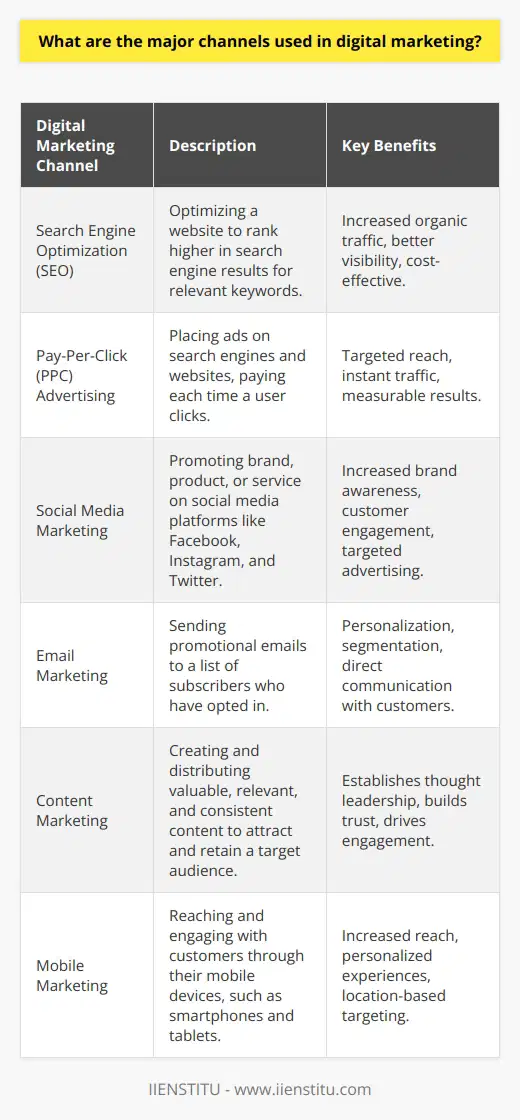
What role does search engine optimization (SEO) play in digital marketing strategies?
Search engine optimization (SEO) plays a crucial role in digital marketing strategies. It helps businesses improve their online visibility and attract more qualified traffic to their websites. By optimizing various on-page and off-page elements, companies can rank higher in search engine results pages (SERPs).
Improving Organic Search Rankings
SEO focuses on improving a website's organic search rankings. This is achieved through a combination of keyword research, content optimization, and link building. By identifying and targeting relevant keywords, businesses can create content that addresses their audience's needs and interests. Optimizing meta tags, headers, and images also contributes to better search rankings.
Keyword Research and Targeting
Effective keyword research involves identifying terms and phrases that potential customers use when searching for products or services. By targeting these keywords in website content, businesses can attract more qualified traffic. Long-tail keywords, which are more specific and less competitive, can help companies rank for niche topics.
Content Optimization
Creating high-quality, informative, and engaging content is essential for SEO success. Content should be optimized for target keywords while providing value to readers. Regular updates and fresh content can also improve search rankings and keep visitors coming back.
Link Building
Link building involves acquiring high-quality backlinks from other reputable websites. These links act as "votes of confidence" and can improve a website's authority and search rankings. However, it's important to focus on natural, relevant links rather than engaging in spammy or manipulative tactics.
Enhancing User Experience
SEO also plays a role in enhancing user experience (UX) on a website. By improving site navigation, load times, and mobile responsiveness, businesses can create a more user-friendly environment. This can lead to lower bounce rates, longer visit durations, and higher conversion rates.
Site Navigation and Structure
A well-organized site structure and clear navigation make it easier for users and search engines to find content. By using descriptive URLs, breadcrumbs, and internal linking, businesses can improve site usability and search engine crawlability.
Page Load Speed
Fast-loading pages are essential for a positive user experience and SEO. Slow load times can lead to higher bounce rates and lower search rankings. Optimizing images, minifying code, and using content delivery networks (CDNs) can help improve page load speed.
Mobile Responsiveness
With the increasing use of mobile devices, having a mobile-friendly website is crucial for SEO. Responsive design ensures that a website adapts to different screen sizes and provides a seamless user experience across devices. Google also prioritizes mobile-friendly websites in its search results.
Measuring and Analyzing Performance
SEO involves continuous measurement and analysis to track performance and identify areas for improvement. By monitoring key metrics such as organic traffic, keyword rankings, and conversion rates, businesses can assess the effectiveness of their SEO efforts and make data-driven decisions.
Tracking Organic Traffic
Monitoring organic traffic helps businesses understand how well their SEO strategies are driving visitors to their website. Tools like Google Analytics provide insights into traffic sources, user behavior, and conversion rates.
Monitoring Keyword Rankings
Regularly tracking keyword rankings allows businesses to see how well their website is performing for target keywords. This information can help identify opportunities for improvement and adjust SEO strategies accordingly.
Analyzing Conversion Rates
Ultimately, the goal of SEO is to drive conversions and revenue. By analyzing conversion rates from organic traffic, businesses can determine the effectiveness of their SEO efforts in achieving business objectives.
In conclusion, SEO is a fundamental component of digital marketing strategies. By improving organic search rankings, enhancing user experience, and measuring performance, businesses can attract more qualified traffic, engage visitors, and ultimately drive conversions and revenue.
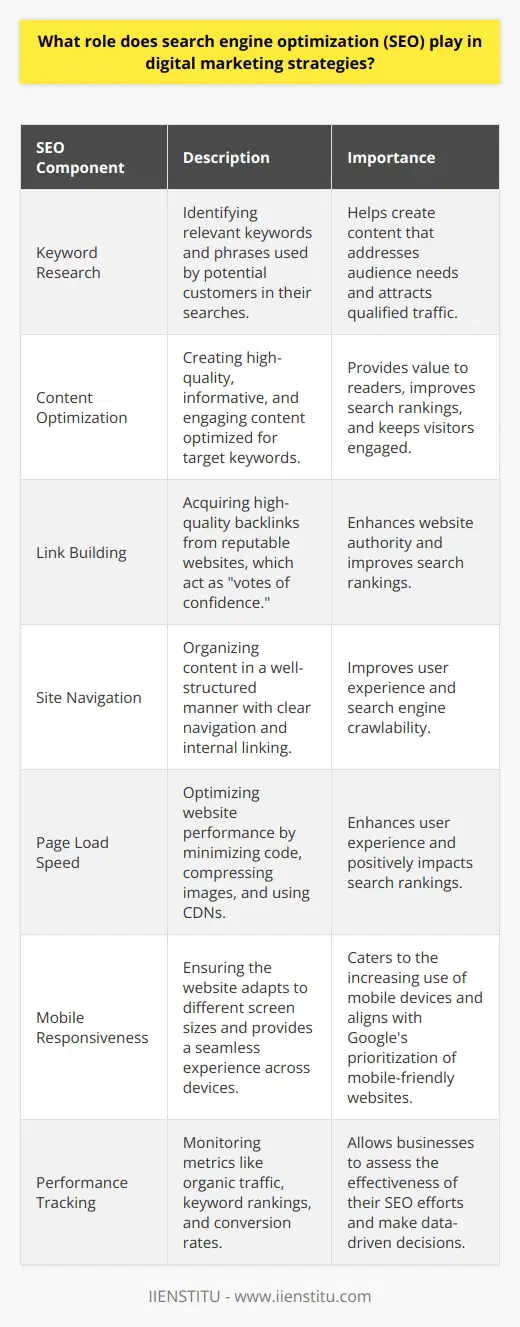
What are the key components of a successful digital marketing strategy?
A successful digital marketing strategy encompasses several critical components that work together to achieve business objectives. These key elements include a well-defined target audience, clear goals and objectives, and a comprehensive approach to reach and engage potential customers across various digital channels. Let's explore these components in more detail.
Defining Your Target Audience
The foundation of any effective digital marketing strategy lies in identifying and understanding your target audience. Conduct thorough market research to gather insights into your audience's demographics, interests, behaviors, and pain points. Use this information to create detailed buyer personas that represent your ideal customers. Tailor your marketing messages and tactics to resonate with these personas.
Setting Clear Goals and Objectives
Establish specific, measurable, achievable, relevant, and time-bound (SMART) goals for your digital marketing efforts. These goals should align with your overall business objectives and be tailored to your target audience. Examples of digital marketing goals include increasing website traffic, generating leads, improving conversion rates, or building brand awareness. Having well-defined goals helps guide your strategy and allows you to track and measure your progress.
Developing a Multi-Channel Approach
A successful digital marketing strategy leverages multiple channels to reach and engage your target audience. This multi-channel approach may include tactics such as search engine optimization (SEO), pay-per-click (PPC) advertising, social media marketing, email marketing, content marketing, and influencer partnerships. Determine which channels are most effective for reaching your target audience and allocate your resources accordingly.
Creating Compelling Content
Content is the backbone of any digital marketing strategy. Develop a content marketing plan that focuses on creating valuable, relevant, and engaging content tailored to your target audience's needs and interests. This content can take various forms, such as blog posts, videos, infographics, webinars, or e-books. Ensure your content is optimized for search engines and shareability to maximize its reach and impact.
Leveraging Data and Analytics
Data and analytics play a crucial role in refining and optimizing your digital marketing strategy. Implement tracking and measurement tools to gather data on your audience's behavior, engagement, and conversion rates across different channels. Regularly analyze this data to identify trends, patterns, and areas for improvement. Use these insights to make data-driven decisions and continuously refine your strategy for better results.
Embracing Adaptability and Continuous Optimization
The digital landscape is constantly evolving, and a successful digital marketing strategy must be adaptable. Stay updated on the latest industry trends, technologies, and best practices. Continuously monitor and analyze your marketing campaigns' performance and be prepared to make adjustments based on the insights gained. Embrace a culture of continuous optimization and experimentation to stay ahead of the curve and maximize your ROI.
Fostering Engagement and Building Relationships
Engaging with your audience and building genuine relationships is key to long-term success in digital marketing. Encourage two-way communication and actively listen to your audience's feedback, questions, and concerns. Respond promptly and provide valuable solutions to their problems. Foster a sense of community around your brand through social media interactions, user-generated content, and personalized experiences. Building strong relationships with your audience leads to increased brand loyalty and advocacy.
By focusing on these key components and adopting a strategic, data-driven, and customer-centric approach, businesses can develop a successful digital marketing strategy that drives measurable results and achieves their desired outcomes.

How can a company measure the effectiveness of its digital marketing campaigns?
Measuring the effectiveness of digital marketing campaigns is crucial for companies to optimize their marketing efforts and maximize ROI. Various metrics and tools can be employed to assess the performance of digital marketing initiatives and make data-driven decisions.
Key Performance Indicators (KPIs)
Companies should establish KPIs that align with their marketing objectives. These may include website traffic, lead generation, conversion rates, and customer acquisition costs. By tracking these metrics regularly, companies can identify trends and areas for improvement.
Web Analytics
Web analytics tools like Google Analytics provide valuable insights into website performance. Companies can monitor website traffic, bounce rates, time on site, and user behavior. This data helps determine the effectiveness of marketing campaigns in driving quality traffic and engagement.
Conversion Tracking
Implementing conversion tracking allows companies to measure the number of visitors who complete desired actions, such as making a purchase or filling out a form. This data helps calculate conversion rates and identify the most effective marketing channels and campaigns.
A/B Testing
A/B testing involves creating variations of marketing elements, such as ad copy or landing pages, and comparing their performance. By conducting A/B tests, companies can optimize their campaigns based on data-driven insights and improve conversion rates.
Customer Feedback and Surveys
Collecting feedback from customers through surveys and interviews provides qualitative insights into the effectiveness of marketing campaigns. This feedback helps companies understand customer preferences, pain points, and areas for improvement in their marketing efforts.
Social Media Metrics
For campaigns leveraging social media, companies should track metrics like engagement rates, follower growth, and social referral traffic. These metrics indicate the level of brand awareness and engagement generated through social media marketing.
Return on Investment (ROI)
Calculating the ROI of digital marketing campaigns is essential for justifying marketing spend and making informed budgeting decisions. By comparing the revenue generated from marketing efforts to the costs incurred, companies can determine the profitability of their campaigns.
Marketing Attribution Models
Attribution models help companies understand the contribution of different marketing touchpoints in the customer journey. By assigning credit to various channels and campaigns, companies can identify the most effective marketing efforts and allocate resources accordingly.
Regularly Review and Adjust
Measuring the effectiveness of digital marketing campaigns is an ongoing process. Companies should regularly review their metrics, identify areas for improvement, and make data-driven adjustments to optimize their marketing strategies.
By leveraging these measurement techniques and tools, companies can gain valuable insights into the performance of their digital marketing campaigns. This enables them to make informed decisions, optimize their marketing efforts, and achieve better results.
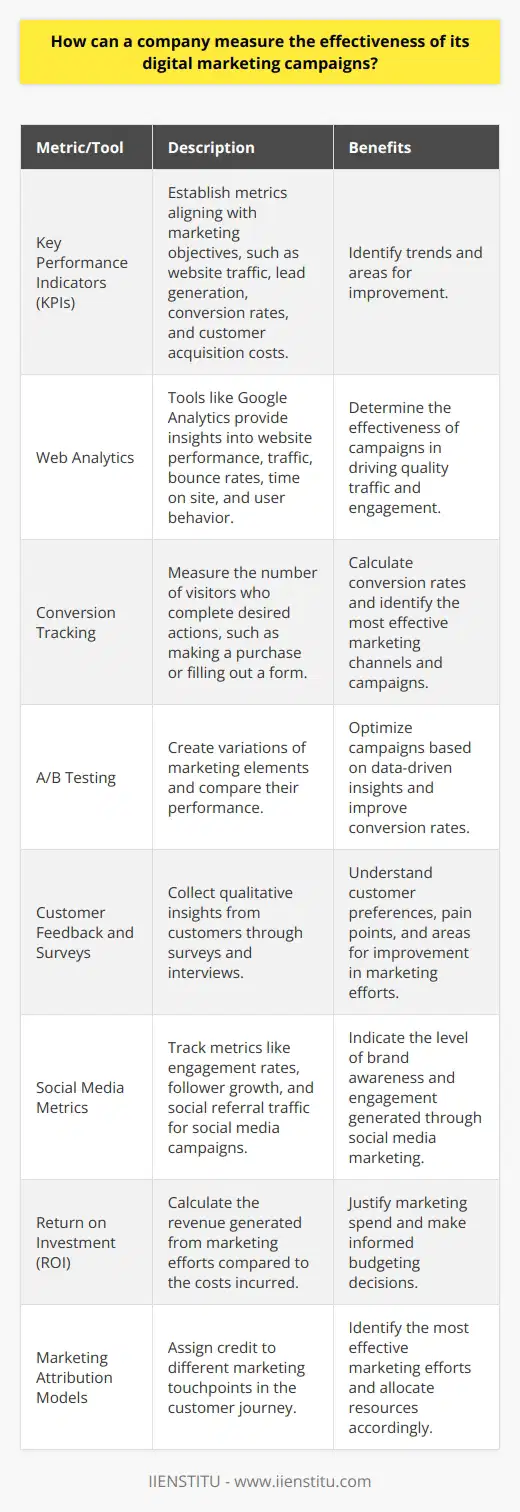
What role does data analysis play in optimizing digital marketing efforts?
Data analysis plays a crucial role in optimizing digital marketing efforts by providing valuable insights into customer behavior and preferences. By collecting and analyzing data from various sources, such as website analytics, social media, and email campaigns, marketers can gain a deeper understanding of their target audience and make data-driven decisions to improve their marketing strategies.
Identifying Target Audience
Data analysis helps marketers identify their target audience by revealing demographic information, interests, and online behavior. This information allows marketers to create buyer personas, which are fictional representations of their ideal customers. By understanding their target audience, marketers can create more effective marketing campaigns that resonate with their customers and drive better results.
Optimizing Marketing Channels
Data analysis enables marketers to identify the most effective marketing channels for reaching their target audience. By analyzing data from different channels, such as social media, email, and paid advertising, marketers can determine which channels generate the highest engagement and conversions. This information allows them to allocate their marketing budget more effectively and focus on the channels that deliver the best results.
Improving Website Performance
Data analysis can help marketers optimize their website performance by identifying areas for improvement. By analyzing website analytics data, marketers can determine which pages are performing well and which ones need improvement. They can also identify user behavior patterns, such as bounce rates and time spent on the site, to optimize the user experience and increase conversions.
Personalizing Marketing Messages
Data analysis enables marketers to personalize their marketing messages based on customer behavior and preferences. By analyzing customer data, marketers can create targeted marketing campaigns that deliver relevant content and offers to specific segments of their audience. Personalized marketing messages have been shown to increase engagement and conversions, as customers are more likely to respond to content that is tailored to their interests and needs.
Measuring Marketing ROI
Data analysis is essential for measuring the return on investment (ROI) of digital marketing efforts. By analyzing data from various marketing campaigns, marketers can determine which campaigns are generating the highest ROI and adjust their strategies accordingly. This information allows marketers to optimize their marketing spend and focus on the campaigns that deliver the best results.
Continuously Improving Marketing Strategies
Data analysis is an ongoing process that enables marketers to continuously improve their marketing strategies. By regularly analyzing data and making data-driven decisions, marketers can stay ahead of the competition and adapt to changing customer behavior and preferences. This approach allows marketers to create more effective marketing campaigns that drive better results over time.
